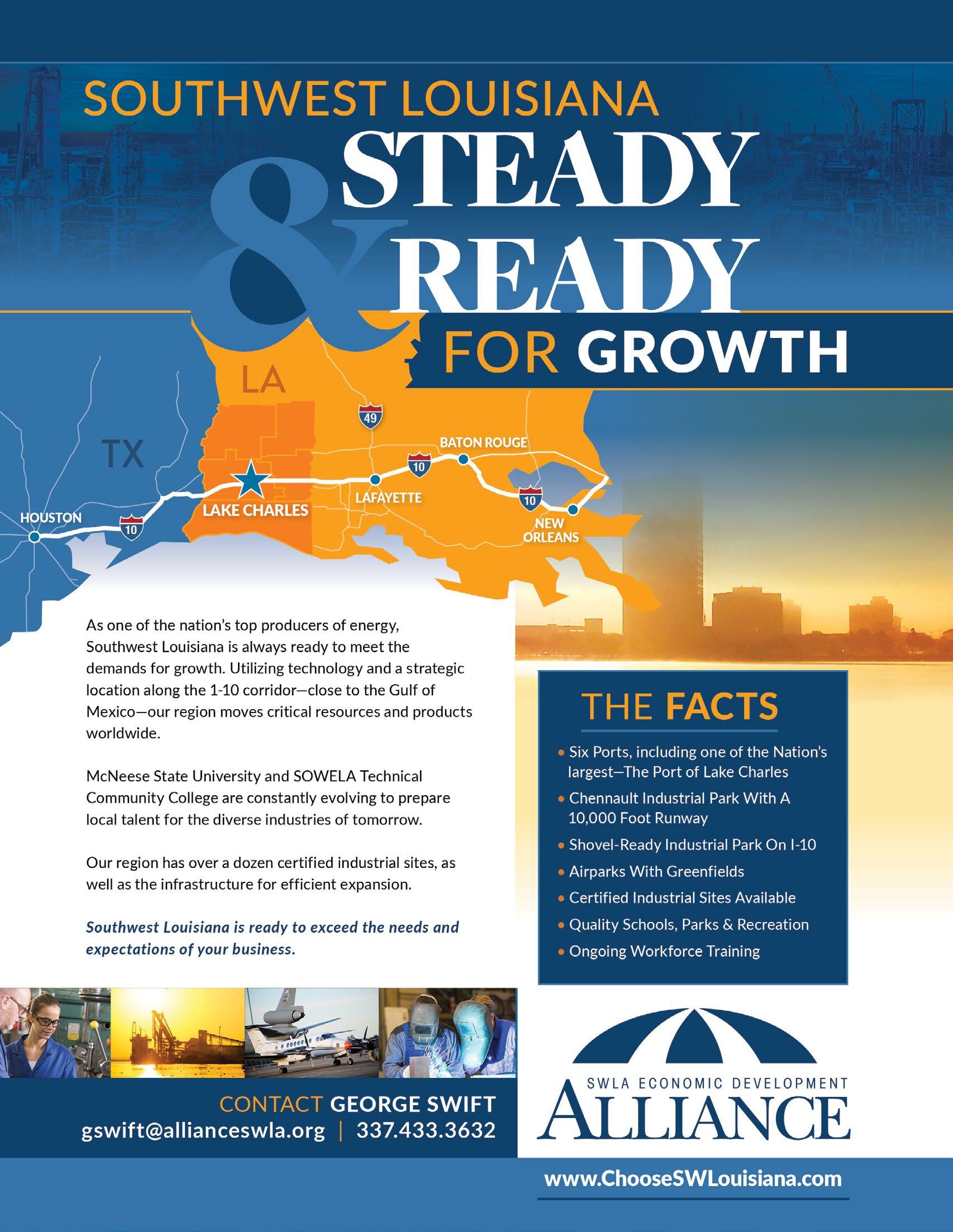




















VIRGINIA: A TOP STATE FOR BUSINESS
OKLAHOMA: LAND OF OPPORTUNITY






















VIRGINIA: A TOP STATE FOR BUSINESS
OKLAHOMA: LAND OF OPPORTUNITY
INDUSTRY OUTLOOK: Financial Technology Going Deeper into More Financial Transactions
Smart phone technology and creative banking applications are driving the development and accessibility of fintech for banking and other financial services.
 By David Hodes
By David Hodes
INNOVATION AND STRATEGIES: Data Center Development Surging to Meet Increasing Demand

So much data is accumulating each second of every day that more and bigger data centers are lining up for the storage and memory challenge.
By David HodesINDUSTRY INSIGHT: Information Technology is Doing It All

Everything in business is run or operated by some form of information technology application. But there’s much more to come.
By DavidHodes
ARKANSAS: DESTINED FOR SUCCESS
WYOMING: A BUSINESS -FRIENDLY TAX CLIMATE
ASSOCIATE PUBLISHER
Alan Reyes-Guerra areyes@bxjmag.com 205-862-5175
EDITORIAL CONTRIBUTORS
David Hodes
CREATIVE DIRECTOR
Clint Cabiness clint@dialedinmediagroup.com 205-613-5910
EDITORIAL OFFICE
King Publishing, Inc. 1000 Stafford Court Birmingham, Alabama 35242 Tel: 205-862-5175
ONLINE MEDIA ASSISTANT
Sonia Buchanan Nick Boliek nick@dialedinmediagroup.com
SUBSCRIPTION CHANGES & REQUESTS
205-862-5175 or www.bxjmag.com
King Publishing, Inc., 1000 Stafford Court, Birmingham, AL 35242; www.bxjmag.com. Advertising rates are furnished upon request. Subscriptions are free to those who qualify. Non-qualified subscriptions are $69 in the U.S.; $89 in Canada and Mexico; elsewhere outside the U.S. is $99 for 10 issues. Back issue rate is $6 when available. Payment must accompany order. The views expressed in all articles and advertisements appearing in the Business Xpansion Journal magazine are solely those of the author and advertiser, respectively.
© Copyright 2022, King Publishing, Inc. All rights reserved. No partof this publication may be reproduced without written permission from the publisher.
POSTMASTER: Send change of address notification to Business Xpansion Journal, 1000 Stafford Court, Birmingham, AL 35242. Subscribers can make address changes by calling 205-862-5175 or by e-mail at www.bxjmag.com.
1000 Stafford Court, BIRMINGHAM, AL 35242 TEL: 205-862-5175 Printed in the U.S.A. 2001




 BY: DAVID HODES
BY: DAVID HODES
The rise of financial tech, or fintech, has created more opportunities for a quicker, faster, and more decentralized and streamlined banking experience, even as it still has critics warning about using such inventions as cryptocurrency that have proven to be volatile.
Fintech today is used to help companies, business owners, and consumers better manage their financial operations, processes, and lives by utilizing specialized software and algorithms that are used on computers and, increasingly, smartphones.

Examples of fintech applications include robo-advisors, payments apps, peer-to-peer (P2P) lending apps, investment apps, and crypto apps, among others. There are three broad categories of users for fintech: business-to-business for banks and their business clients, business-to-small businesses for small businesses, and consumers.
But first, a deeper dive into what these relatively new digital currency assets are all about is in order.

Cryptocurrency serves as a medium of exchange, a store of value, and a unit of measure, according to a research guide. While cryptocurrencies have little inherent value, they are used to price the value of other assets.
Bitcoin, launched in 2009, is a cryptocurrency (means of payment) but it can be seen as a speculative commodity (how much is it trading for). It is widely considered one of the first digital assets in the financial technology realm.
Digital assets, also known as crypto assets, are digital representations of value made possible by cryptography and blockchain (more about blockchain next). Their original intent was to serve as a vehicle for transferring value without the use of a bank or other trusted third-party entity.


Cryptoassets (digital assets) are categorized into three main types: cryptocurrencies, crypto commodities, and crypto tokens. One emerging discussion is the concept of stablecoins, cryptocurrencies pegged to a stable asset like the U.S. dollar, and may become a critical component in decentralized finance going forward.
In response to the 2008 global financial industry crash, a person, or an entity, named Satoshi Nakamoto developed a protocol for a peer-to-peer electronic cash system. That protocol
became the foundation for distributed ledgers called blockchains.
Blockchain is a bit like a global spreadsheet, according to the research. It does not have a central database; instead, it runs on computers provided by volunteers around the world. A blockchain is public: anyone can view it at any time because it resides on the network, not within a single institution. A blockchain allows a person to safely send money to another person without going through a bank or financial services provider.
As digital money becomes increasingly widespread, and coupled with an estimate that more than 50 percent of the world’s population owns a smartphone, some believe that blockchain technology will replace the banking industry’s old technology. This new financial technology partnership could be the pathway to widely available digital financial products.

While many economists and bankers still don’t get involved in this sort of financial technology, and as crypto currencies continue and up and down swing between use and acceptance, many policymakers have chosen these fintech concepts to make finance safer after the years of the crash of 2007-2008, when losses on mortgage-related financial assets began to cause strains in global financial markets.
According to Investopedia, a financial information and research company, fintech primarily works by unbundling offerings by such firms and creating new markets for them. Startups disrupt incumbents in the finance industry by expanding financial inclusion and using technology to cut down on operational costs.
Fintech funding is on the rise but regulatory problems exist. In fact, one of the biggest problems to ever face the fintech business is the current issue with cryptocurrencies. The cryptocurrency market has lost over $2 trillion since hitting a record high of $3 trillion in November 2021.
Then there is the case of a cryptocurrency guru who has just crashed and burned. Sam Bankman-Fried, the founder and CEO of FTX Cryptocurrency Derivatives Exchange, has filed for Chapter 11 bankruptcy protection in the U.S., according to a company statement posted on Twitter. Bankman-Fried has also stepped down as CEO and has been succeeded by John J. Ray III, though Bankman-Fried will stay on to assist with the transition.
The crash of FTX happened very fast, according to an article in the New York Times. “In less than a week, the cryptocurrency billionaire Sam Bankman-Fried went from industry leader to industry villain, lost most of his fortune, saw his $32 billion company plunge into bankruptcy and became the target of investigations by the Securities and Exchange Commission and the Justice Department.”
As more information came out about FTX and how BankmanFried did business, Bitcoin, the most popular cryptocurrency, lost more than 10 percent, while Ether, the number two currency by market value, fell 14 percent, according to CoinGecko, a cryptocurrency market tracking company. The crypto market overall was down 10 percent in just one day.
Fintech company Affirm seeks to cut credit card companies out of the online shopping process by offering a way for consumers to secure immediate, short-term loans for purchases. The company was started because, according to their website, “credit cards aren’t working. They lure us in with perks, but end up costing a lot. The average U.S. household has $6,000 in credit card debt.”

While rates can be high, Affirm claims to offer a way for consumers with poor or no credit a way to both secure credits and also build their credit histories.
Another fintech company, Better Mortgage, seeks to streamline the home mortgage process with a digital-only offering that can
reward users with a verified pre-approval letter within 24 hours of applying. “The status quo is broken,” the company states on their website. “The traditional processes around homeownership are opaque and stressful. Fees aren’t transparent and some are simply outrageous in size. Traditional commission structures incentivize sales, not support. It’s a system set up to benefit insiders—not you.”
Fintech company GreenSky seeks to link home improvement borrowers with banks by helping consumers avoid entrenched lenders, and save on interest by offering zero-interest promotional periods. The company was founded on the idea that payment, credit and commerce could be enhanced using technology delivered via an well-designed user experience. “We believed payment and credit could be an asset that empowers and enables commerce, not a distraction or impediment,” the company states on their website.
Other fintech companies include:
• Citcon payments processing, a mobile wallet payment provider enabling global commerce at scale, with a solution that will enable leading retailers to accept and process more than 150 payment methods, including popular digital wallets, local payment schemes, and credit cards preferred by overseas customers through one integration.
• Amaka, an accounting and finance fintech, providing professional software for accountants, bookkeepers and business owners with the need to automate their data entry. A user can save hours by automating the data aggregation process between point-of-sale, online stores and accounting softwares.
• Nymbus, a fintech company that enables banks and credit unions of any size to accelerate growth through new routes to market that includes a full suite of banking technology applications available to modernize and optimize existing channels, and the operational resources to get to market quickly with a
full-scale digital bank immediately positioned to capture new niche customer segments.
• Roboadvisors, which are apps or online platforms that optimally invest your money automatically, often for little cost, and are accessible to ordinary individuals
• Payments apps like Paypal, Venmo, Block (Square), Zelle, and CashApp make it easy to pay individuals or businesses online and in an instant.
• Personal finance apps such as Mint, YNAB, and Quicken SimpliFi let you see all of your finances in one place, set budgets, pay bills, and more.
• Peer-2-Peer (P2P) lending platforms like Prosper, Lending Club, and Upstart allow individuals and small business owners to receive loans from an array of individuals who contribute microloans directly to them.
• InsurTech is the application of technology specifically to the insurance space. One example would be the use of devices that monitor drivers in order to adjust auto insurance rates.
There are also fintech companies popping up everywhere in business: in accounting and finance, investing and trading infrastructure, fraud prevention and compliance, retail investing and wealth management, plus dozens of other business-to-business and business-to-consumer applications.
Enterprise fintech software is rapidly becoming a key priority for financial firms, according to a study by iShares, an investment management company. Legacy IT systems are extremely costly to maintain and present meaningful risk, while new systems are expensive to implement and subject to future obsolescence.
Enterprise fintech, or outsourced fintech solutions, can address this without subjecting companies to either option. For example, zero-code software platforms, which allow companies to integrate financial software without the need for their own coding, can deliver complex custom applications and systems for financial companies that can be easily deployed and integrated.
Currently representing an $18 billion market, outsourced fintech software is expected to capture $26 billion in revenues by 2025. The global fintech market is expected to reach $332.5 billion by 2028, representing a 20% growth from 2021’s $112.5 billion market, according to the study.
In an article about the future of financial technology published by McKinsey and Company, this observation was made: “Banking could be in the throes of a shift. Customer engagement could move to new distribution points as non-banking, tech, and fintech players embed financial products into their propositions. New revenue sources could emerge, such as the monetization of customer and market data insights. It will be important in this context to pay attention to the shifting profit pools and to adjust pricing and monetization approaches to reflect those changes.” X

A look inside the Douglas County, Georgia Google data center. Google has had a data center presence in the Atlanta region since 2003, investing over $1.2 billion in Douglas County and creating over 500 jobs in Georgia.
 BY: DAVID HODES
BY: DAVID HODES
So much data is accumulating each second of every day that more and bigger data centers are lining up for the storage and memory challenge.
The amount of data in the world was estimated to be 44 zettabytes at the beginning of 2020 (a zettabyte is 1 sextillion bytes). By 2025, the amount of data generated each day is expected to reach 463 exabytes globally.
Google, Facebook, Microsoft, and Amazon store at least 1,200 petabytes of information, according to a science blog by Seed Scientific. Every 24 hours, 500 million tweets are published on Twitter. Global Instagram users surpassed the 1 billion mark in 2020. 18.7 billion text messages are sent every day worldwide.
Online gaming company Electronic Arts processes roughly 50 terabytes of data every day. Other research shows that, every minute, there are 41,666,667 messages shared on WhatsApp; 347,222 stories posted on Instagram; and 150,000 messages shared on
Facebook. People sent 500 million tweets daily—or 5,787 tweets per second—and 3,026,626 emails every second.
All of that data has to be managed— uploaded, downloaded, stored, connected, analyzed, reloaded, repackaged, resent—and more and bigger data centers are needed to do all that heavy lifting.
Diverse data sets arriving in massive amounts at a high velocity require specialized servers to handle the demand. These servers are built with specific hardware and software to run the computation and storage of large quantities of structured, semi-structured, and unstructured data, as described by Datacenters.com, a technology marketplace and aggregator.
Large volumes of information too complex
to be managed and processed by traditional methods are categorized as big data. In addition, big data grows exponentially over short periods of time, requiring advanced hardware and software to process the information.
To handle large volumes of data, the servers must have sophisticated physical infrastructure capable of storing, retrieving, and processing complex data sets. In many cases, organizations and companies will need to parse messy, unorganized data sets and require servers that can run NoSQL and NewSQL systems (which are relationship database management systems).
Parallel computing is another feature big data servers need to handle big data. This type of computation allows multiple calculations to run simultaneously.
Hyperscale data centers are large mission critical facilities designed to support robust, scalable applications, often associated with big data-producing companies.

Apple, Facebook, Google, Microsoft, and Amazon Web Services are the leading investors contributing to the hyperscale development in the US. These operators invested in 19 hyperscale facilities collectively in 2021. In 2021, several of these hyperscale operators announced the expansion, development or acquisitions of additional lands for future data center growth.
Big data centers that take up at least 100,000 square feet or more (some as much as 1 million square feet) are located all across the country, with the biggest in the northern Virginia suburbs of Washington, D.C., Los Angeles, Miami and Chicago, according to datacenters.com.
Data Center Dynamics, a trade publication, reported that among the biggest data centers in the world are National Security Agency’s Saratoga Springs, Utah, data center, at 1.5 million square feet, that includes a 100,000-square-foot data center space, and more than 900,000 square feet in technical

support and administrative space; and the $3 billion China TelecomInner Mongolia Information Park, at a reported 10,763,910 square feet.
Northern Virginia is the largest data center market in the world, gaining that designation over the last few years. In fact, 22 percent of the total data center capacity in northern Virginia was added between the second half of 2018 and the first half of 2019. Economic developers there estimate that in 2018 the data center industry in Virginia directly provided approximately 14,644 full-time-equivalent jobs with an average annual pay of $126,000; $1.9 billion in associated pay and benefits; and $4.5 billion in economic output.
Other economic development standouts include the 14 Google data center campuses in the U.S. alone, including a massive $600 million, 375 acre campus in north Texas.
This year, there will be 94 zettabytes of data volume creation and consumption. In 2023, that number will be 118 zettabytes. By 2024, it will be 149 zettabytes.
Clearly the new data center building trend needs to continue. Already there are a handful of new data centers operational, according to Build Central, a building database provider, such as the 168,488 square foot Facebook/Meta data center in Fort Worth, open since late 2021; a newly remodeled Microsoft data center in San Antonio; and the first phase of a new $25 million 281,792 square foot Google data center in Omaha, Nebraska.
There are also a number of new data centers either planned or under construction right now:
• Amazon web services data center. This is a planned 240,000 square foot center, estimated at $25-$100 million, to be built in Springfield, Virginia.
• Project Morgan Apple data center. This $1.3 billion, 400,000 square foot building is planned for completion in early 2024 in Waukee, Iowa.
• Meta Gallatin data center. A 982,000 square foot, $800 million data center in Gallatin, Tennesse under construction now and expected to be operational in late 2023.
According to the latest research report from Arizton Advisory and Intelligence, a data center research company, the data center construction market is expected to grow 5.9 percent during 2021-2027.
Key construction contractors for this work include AECOM, based in Dallas; DPR Construction, based in Redwood City, California; Holder Construction, based in Phoenix, Arizona; Jacobs, also based in Dallas; M+W Group, based in Stuttgart, Germany; Bouygues Construction, based in Paris, France; and Turner Construction, based in New York.
The data center construction market is expected to reach $51 billion in 2021 and up to $73 billion by 2027, according to Arizton research.
In 2022, key data center trends will be about the procurement of renewable energy, the design of data centers to support the installation of liquid immersion and direct-to-chip cooling, and edge data center

deployments in Tier 2 and Tier 3 cities worldwide.
It is predicted by Arizton research that the data center market will see a strong rise in mergers and acquisitions, and joint venture activities. The due diligence process in identifying the target location of data center development will increase. Efficient infrastructure procurement will increase as well, with a focus on modern technologies and a modulardesign approach during the forecast period.
Other trends in database development, as outlined in a white paper by 451 Research, an information technology research and advisory company, include:
• PFM designs. These are prefabricated modular datacenters assembled using one or more structural building blocks, put together and tested in a factory-like environment and shipped for final on-site integration. PFM datacenter construction offers standardization, compressed timelines, tighter budget controls, lowered risk, and better alignment with business goals by adding capacity in a more modular fashion driven by demand.
• Connectivity. The rise of public cloud is putting increased pressure on enterprise providers, but it is also opening up new opportunities to connect and integrate public cloud with private cloud and non-cloud services. As a result, interconnectivity (enterprises connecting directly to cloud providers, partners, carrier networks, etc.) is becoming an increasingly critical service. Application and data resiliency, including disaster recovery, will in many cases be achieved at the network and software level, by replicating processes and data across a network of facilities spread within and between regions.
• Edge datacenters. The term ‘edge computing’ covers a range of workload types and use cases, including some that are established and some that are emerging. Demand at the edge
is expected to be a significant driver for new datacenter types and form factors including micro-datacenters (small form-factor sites including prefabricated micro-modular sites) but also new centralized facilities.

• Power hub. Large datacenters could effectively become their own power utilities and act as energy hubs. Being able to control the quantity, quality and security of their power source via, for example, private micro-grids will improve energy resiliency.
Raj Hazra, the senior vice president and general manager of the Compute and Networking Business Unit at Micron Technology, commented about the future of data centers on a YouTube interview. He first discussed the challenges associated with the tremendous amount of data today. “We have to look at these challenges (with data) to not only generate insights but generate them more accurately, more quickly and getting the value out of it in an instantaneous form,” he said. “We have to look at sea changes in the way memory and storage are constructed in the platform, which is why it’s the center of attention right now.”
Hazra said that the biggest challenge today is that it we are drowning under data storage. “The first challenge (for data center operators) is that they have to continue to provide that expected performance at a time when algorithms are becoming more demanding, and, frankly customers are expecting more. That is the heart of why we will continue on an unabated pace to work on developing data centers.
“I am talking about the golden age of memory. People talk about the golden age of data. But it really is the golden age of storage and memory,” he said. “The time has arrived to completely bust through some of the older paradigms of what memory meant, which is attached to compute, to driving the central thematic structures of how data movement, and data intensive computing, gets done.”X
Google invested $580 million last year to expand its Belgium data centre presence in SaintGhislain, Hainaut, close to the French border.
 BY DAVID HODES
BY DAVID HODES
Everything in business is run or operated by some form of information technology application. But there’s much more to come.


Information technology is basically in or behind just about everything a modern business does today to run and improve their operations.
Networks, data bases, data synchronization, analytics, content delivery, content managing, transaction processing, business automation, communication—nearly all of what a business does every day is connected to information technology in some way. And those connections are growing fast.
According to new research from ConnectWise, small and medium-sized businesses will create over $90 billion of new spending toward managed IT services between 2021 and 2026.

The National Academy of Sciences (NAS) reports six findings from their study of IT:
• Advances in IT are far from over, and some of the biggest improvements in areas like artificial intelligence are likely still to come.
• These advances in technology will result in automation of some jobs, augmentation of workers’ abilities to perform others, and the creation of still others.
• The recent increase in income inequality in the United States is due to multiple forces, including advances in IT and its diffusion, globalization, and economic policy.
• IT is enabling new work relationships, including a new form of on demand employment.

• As IT continues to complement or substitute for many work tasks, workers will require skills that increasingly emphasize
creativity, adaptability, and interpersonal skills over routine information processing and manual education.
• Policy makers and researchers would benefit significantly from a better understanding of evolving IT options and their implications for the workforce.
Most company CIOs say their role has expanded into new areas like analytics, talent acquisition, and sales and marketing, according to a study by UI Path, a global software development company.
New uses of IT in teaching, including online courses, are increasingly available and hold the potential to expand access to education to those underserved across the country, according to the NAS report.
The labor market needs people with IT skills, and this new century demands the kind of life-long learning IT can provide as other learned skills become obsolete with the advent of new technologies.
Researchers say that 21st century education must adapt to the needs of the new clientele by offering asynchronous, self-paced, competency-based online learning, and have identified three areas of education which will necessarily change the education environment in the near future:
• Knowledge will become more “democratized,” as knowledge will increasingly be available online, meaning that the role of the university will change.
• Digital technologies will transform the way education is delivered to the students/clients, and an increase in global mobility will bring together students, researchers and universities.
• IT applications also promise a stronger collaboration with business, as education will become competency-based to match the skills demanded by employers.


One way all these changes can happen is through a greater use of artificial intelligence (AI), which are services or platforms for machine learning. AI is projected to contribute to the economy around $15.7 trillion by 2030.
According to a report by the National Institute of Sciences, recent
advances in AI have been driven largely by advances in machine learning—algorithms that improve through experience, often by identifying patterns from historical data that may be extrapolated to future purposes.
For example, such techniques have been used to predict patient responses to medical treatment based on historical medical records and to process human (or “natural”) language in useful ways.
The NAS study also found that AI will automate the management of educational institutions. These include admissions, timetables, attendance, and homework monitoring. AI will be used to select relevant learning content across learning platforms for each student, based on his or her personalized needs.
AI technologies which are student-facing, aim to provide learners wherever they are high-quality and personalized lifelong learning possibilities. Some of the uses of student-facing AI are intelligent tutoring systems (ITS), which provide individualized tutorials for students. Students are provided with the content they need in specific subjects, as the system tracks their progress and adjusts the level of difficulty to each individual’s needs.
But for now, getting to that educational IT advantage is all about economics. AI is costly, and underfunded schools do not always have the budget to purchase new technologies which also require the staff to master new digital skills.
A particular set of algorithms, called deep neural networks, have been a driver of recent advances in areas such as computer vision, speech recognition, and text analysis.
Advanced communications mining is gaining prominence. That refers to the application of conversational data intelligence that focuses on understanding and extracting value from communications processes, and the practice of converting the unstructured information these processes are built on into structured, machine-readable data that can then be used for analysis and automation.
Using IT, the unstructured content contained within various messages—emails, calls, chats, service tickets—can be extracted and transformed via AI into workable data used to train Natural Language Processing (NLP) models. AI helps millions of emails processed each day with no-touch routing and detailed customer insights gathered along the way.
Further AI-fueled improvements in NLP also allow for Intelligent Document Processing, which will take even more of the manual work out of a business’s day-to-day paperwork, according to the UI Path report.
AI robots will be able to “read” and “understand” a variety of documents in a variety of formats, whether it’s in a different template, handwritten, or even scanned skewed or improperly.
As advantageous as IT/AI is for a business, there are still ongoing challenges. Results of a survey of business owners by a platform development company, Appian, showed that:
• 83 percent of business managers say adapting better to external change requires moderate-to-considerable IT infrastructure and apps improvement.
• Supporting remote workers, integrating information and workflows across the organization, and changing systems and processes quickly are the top three areas for improvement as identified by business owners.
• 71 percent reported that relatively few of their applications have AI and/or machine learning capabilities, and 57 percent report that some of their initial AI projects fail.
• Right now, business managers have a 3-12 month backlog on average for planned IT projects, and the situation is worsening as business project demand outstrips IT budget growth.
To truly make a more seamless transition and growth, it’s going to take time and commitment. The UI report found that 34 percent of workers are seeing roles and work patterns change because of automation, and 77 percent of business leaders say they’ll need employees with greater critical thinking and project management capabilities.
According to the National Academy of Sciences, while improvements in and diffusion of IT have had profound effects on many aspects of the workforce, the future effects of these advances on the workforce and the broader economy are difficult to predict. This partly reflects a level of inadequate understanding of the complex interactions among technologies themselves, combined with the skills, organizations, institutions, policies, and human preferences in society.
The NAS report concluded that it is not known whether new technologies will automate and replace workers in existing tasks more rapidly than the economy as a whole (driven by various factors, including automation) creates new demands for labor. “It is easier to anticipate how new technologies will automate existing tasks than it is to imagine tasks that do not yet exist and how new technologies may stimulate greater consumer demand,” according to the NAS report. “Furthermore, the future of employment is not only a question of the availability of tasks to be performed, but how they are organized and compensated. In addition, digital goods have the potential to diffuse rapidly because they are infinitely replicable via shared digital platforms.
“Future innovations could have more immediate impact if organizations become more able to incorporate them quickly. These are matters of business strategy, social organization, economic policies and programs, and political choices and are not simply driven by technology alone.”
The Bureau of Labor Statistics addressed the IT/job loss scenario in their monthly labor review column published in July. “Fears that automation will cause widespread job losses have been raised repeatedly in the past, which, in retrospect, usually greatly overestimated the scale of actual displacement. Recent experience and projections suggest a similar pattern may be occurring with recent developments in AI and robotics. Part of the reason new technology does not produce sharper changes in employment is the diversity of jobs within occupations and the diversity of tasks within jobs, not all of which are equally susceptible to technological substitution.
“Automation of some tasks may also alter the task composition of jobs, rather than simply reducing the number of jobs. The growth of product demand within industries implementing new technology can buffer the employment effects of technological change,” according to the labor review column.
A report by McKinsey and company, a business research company, summed up the future of information technology this way: “When innovation is pushed to the edge and a perpetual-learning culture permeates an organization, the role of IT shifts dramatically. IT can’t support this dynamic environment by sticking to its traditional role as a controlling entity managing technology at the center. The premium will now be on IT’s ability to enable innovation, requiring a shift in its traditional role as protector of big tech assets to a purveyor of small blocks of code. The gold standard of IT effectiveness will be its ability to help people stitch together snippets of code into a useful product.” X

Virginia’s premier talent base makes for a worldclass labor pool ready to meet business needs in all key employee profiles. Across industries, Virginia’s workforce is one of the most productive and educated populations in the country – nearly 40% of the population has a bachelor’s degree or higher, making the Commonwealth the 6th most educated state in the country. Virginia continues to raise the bar when it comes to talent development. Programs such as the Virginia Talent Accelerator Program and the Tech Talent Investment Program make sure Virginians are prepared for the jobs of today and the future.
Virginia’s industries are as diverse as its geography. Home to the largest data center market in the U.S., a varied manufacturing base, and the highest concentration of tech workers in the country, Virginia serves key national and global markets from a central East Coast location.
From beaches to mountains, cities to small towns, there are so many reasons to love living here. Virginia is a place of diversity and natural beauty. With access to a variety of outdoor amenities both in cities and small towns as well as thriving urban centers alive with arts and culture, Virginians have a vibrant quality of life.
Virginia’s central East Coast location and advanced infrastructure enable companies to get products to market quickly. Virginia’s integrated transportation system of highways, railroads, airports, and seaports provide logistical advantages for companies in every industry.









Virginia also has a business climate advantage. As the northern most right-to-work state on the East Coast, Virginia is consistently ranked as a top state for business. Virginia has a stable 6% corporate income tax, lower than the national median of 6.5%. Virginia has also maintained a AAA rating since 1983, longer than any other state.
For more information on why Virginia is a great place for business, please contact the Virginia Economic Development Partnership at 804-545-5600 or visit their website at www.vedp.org
The Port of Virginia, the third largest East Coast port by container volume, has four of its six terminals near Virginia Beach city limits. Its world-class port facilities have proven to be a great asset to the region for moving goods across the country and internationally. They are a real draw for businesses in the shipping industry. The Port has been proactive in keeping up with the increase in global trade over the years. Its most recent investment is a $150 million dredging project that will provide The Port of Virginia with the deepest and widest shipping channels on the eastern seaboard by late 2024, making it possible to accommodate two ultra-large container vessels simultaneously. Enabling two-way traffic in and out of the harbor will support increased commercial activity at The Port of Virginia and directly benefit the business community in Virginia Beach.
Where the Chesapeake Bay meets the Atlantic Ocean, the vibrant coastal City of Virginia Beach offers the winning combination of business and pleasure. The City boasts a skilled workforce, a fair tax structure and low cost of doing business, a quality education system, and a diverse economy. Its strategic location in the heart of the U.S. East Coast is another asset that allows convenient access to domestic and international markets through an extensive multi-modal transportation network.
The City, once considered a bedroom community and military town, has experienced a significant shift in its economic foundation over the last decades. Virginia Beach, the largest city in Virginia by population size, located within a 1.7 million person metropolitan area, has blossomed into a thriving business center and has laid the foundation for what comes next.
The City of Virginia Beach has the infrastructure needed to support the economy of the future. Currently, a significant area of focus is offshore wind energy. In 2024, construction is set to begin on the largest offshore wind farm in the country, only 27 miles off the coast of Virginia Beach. Significant public and private investments were made to prepare for the 2.6 gigawatts of renewable energy that will soon be produced in the Atlantic.
Another area of focus for Virginia Beach is the recent arrival of transatlantic broadband cables that converge towards and land in Virginia Beach. These ultra-high-speed fiber optic cables allow data to be shipped around the world at the highest speed possible, which is essential in developing the new digital era. The City’s state-of-the-art network infrastructures and facilities make communicating globally easy and reliable while meeting the needs of businesses that require high capacities and low latency to run their operations.
The City’s Department of Economic Development is also taking proactive steps in helping businesses locate in Virginia Beach and take advantage of all the opportunities that will come from these recent infrastructure improvements. Last year, the team established two soft landing spots for out-of-market businesses that wish to establish a presence in Virginia Beach. The first is an international incubator geared towards foreignbased companies that need office space to get their operations off the ground and grow their sales volume before establishing their own office or manufacturing facility in the City. The second is a bio accelerator, a membership-based facility that offers co-working space, laboratories, and business development programming specific to biotech and life sciences startups and small businesses.
In addition to these two facilities, the City of Virginia Beach plans to open an industrial incubator to offer a temporary location for light industrial manufacturers who need space before establishing a permanent location in the City. This soft landing facility, and the other two, are part of an incentive program that aims to support businesses that are new to the City by providing them with the resources and connections they need for a successful start. Those selected to join the incubators or accelerator also receive ongoing support from the Virginia Beach Department of Economic Development, free of charge. This white glove service is a bonus that can make all the difference in growing a successful business in Virginia Beach.
For more information on opportunities in Virginia Beach, contact the Department of Economic Development at 757-3856464 or visit yesvirginiabeach.com/bxj
The Blue Ridge Parkway. Twenty-four major rivers for paddling and fishing. Over 30 miles of urban greenway. A nationally recognized outdoor culture. Dining. Breweries. Museums. Live performances. Sounds like a great place to visit,




but is it the ideal place to do business? (Spoiler alert: it is)
Along with an impressive aesthetic, the Roanoke Region of Virginia is primed for investment with low cost of living, excellent location, and speed-to-market solutions. The region boasts pad-ready sites ranging from 10 to 130+ acres prepared for investment from users ranging from food and beverage, transportation equipment, advanced manufacturing, data centers, and tech/innovation industries.
UTILITIES. Abundant utility abilities exist throughout the region with water and sewer capacities regionally more than 55 million gallons per day. Food and beverage industry enjoys high quality water supply and considerable savings on rates, wastewater permitting, and treatment costs. Electrical and natural gas connections are widely available, fueling the energy needs of industry today and into the future.
LOCATION. Sites are all literal minutes from interstate or US highway, many of which a few miles from either Interstates 81 or 64. Located equidistant between New York and Atlanta on the US East Coast with convenient access to five Interstates, the Roanoke Region is a day’s drive to 66 percent of the US population.
ACCESS. The region is served by the Roanoke-Blacksburg Regional Airport currently providing nonstop service to nine destinations. Industry is one stop from anywhere in the world by way of Roanoke-Blacksburg Regional Airport, the fourth largest cargo airport in the Commonwealth of Virginia with UPS and FedEx air freight operations.
COST OF DOING BUSINESS. Business costs are conducive to growth. Costs of doing business are rated 18 percent below national average, and the cost of living is 12 percent below the national baseline. With strong transportation access to the East Coast and Midwest, your customers reap the benefits of lower shipping costs. The bottom line is that our low costs equal high returns.
INNOVATION. With more than 25 colleges and universities within an hour, the region has a higher undergraduate enrollment than Austin, Boston, San Francisco, and the Research Triangle. Research assets at Virginia Tech touch manufacturing, agriculture, food science, innovation/biotech and health among other fields.
WORKFORCE DEVELOPMENT. Diverse and suitable training programs are available for a range of industry including STEM fields, industrial automation, industrial maintenance, and
more. With partnership opportunities through the top-ranked Virginia Talent Accelerator and area community colleges, these programs work to the advantage of companies expanding into the Roanoke Region of Virginia.
The Roanoke Region is the perfect mix of metro, mountains, innovation, and industry. It’s a beautiful, vibrant area with the perfect amount of big-town amenities and small-town prices, making it the ideal place to set up shop and put down roots. Visit Roanoke.org today to learn more about the region and all it has to offer..

Welcome to the “New Blue Collar.” Newport News is a place where the world’s greatest ships get built, along with some of the nation’s greatest most advanced industries. All of which start with the grit and gumption of skilled tradesmen and businessmen who roll up their sleeves and move projects into new frontiers.
Every year, more tech companies choose to call Newport News home. With world-class education, entertainment, dining, and recreation, Newport News is building a diverse community eager to welcome you as their newest neighbor.
Easily accessible by air, train, and car, Newport News’ central location gives its businesses a rich offering of experiences. The Newport News/Williamsburg Internal Airport is close by and the major hubs of Washington D.C., Norfolk, and Richmond are an easy car ride away. The modes of transportation to move goods to and from the airport include the Port of Virginia, rail (CSX), and excellent highways (I-64, I-664, Routes 58 & 460).
Newport News and the Hampton Roads region retain many of the world’s most well-known organizations. Their domestic and international profiles are substantial, and their area is decidedly pro-business. Some of the major employers in Newport News include Newport News Shipbuilding; Canon Virginia; Liebherr Mining Equipment; Solo; Avery Aviation; Avelo; headquarters to Ferguson, Huntington Ingalls Industries, and Liebherr USA; Fairlead; Muhlbauer; and Swisslog. Newport News is also targeting Energy with Offshore Wind and Battery.
Thinking of relocating? If your business is part of Virginia’s $25.2 billion food and beverage processing industry, then Newport News is your location for a connected and centralized site. Leading companies like Pepsi Bottling Company, Maola, and High Liner Foods are located here.
Newport News’ commitment to Advanced Manufacturing starts young. An enviable offering of trade schools and workforce education programs means a highly capable talent pool for your company to tap into. Virginia Peninsula Community College has a leading Workforce Development program, designed for individuals or organizations large and small. Beyond education

and training, your company can take advantage of tax incentives that help industrial companies make the most of their money.
If you are thinking about starting a Tech company in Newport News, you aren’t the first. Industry leaders like NASA and Canon call this area home. They recently unveiled the TechCenter: over 1 million square feet of collaborative office, retail, and research space in partnership with technology leaders, like Jefferson Lab and Virginia Tech Corporate Research Center. The city is committed to helping you get started with tech incentives, including a business license tax abatement of 50% for a period of 10 years for qualifying companies.
Another target sector is Aviation & Aerospace. Centrally located in the heart of Hampton Roads, you’re a short distance from military bases and the major airports in Newport News, Norfolk, Richmond, and D.C. Alcoa Howmet and NASA Langley Research Center are nearby. Because of Newport News’ location and existing industries, you’ll find tens of thousands of trained military workers well-versed in the industry.
Give your business every advantage by locating in one of Newport News’ state-designated Enterprise Zones. You’ll be rewarded for job creation and investment in new construction, renovation, expansion and more. The zones span most commercial and industrial areas of the city, providing flexibility based on the size, needs, and aspirations of your company.
If you’re a developer or investor looking to get ahead of the curve, the new Opportunity Zones can give your project and edge. There are seven zones, and each present opportunities to defer capital gains taxes while benefitting underserved areas.
Newport News is home to a stable, strong, and diverse economy. With a favorable labor climate and a highly productive workforce, businesses will find that the costs of labor are low for companies located here.

Newport News is the the sixth largest city in Virginia. With a strong commitment to the arts and culture, this city is home to museums, theaters, and historical sites. You can experience the serene beauty of a river meeting the ocean, while being only a few hours from a storied mountain range. With their diverse assortment of top-notch public and private schools, affordable housing, easy day trips to beaches and mountains, and tax incentives, you’ll find that Newport News gives you the best of all worlds. For more information, please visit their website at www.newportnewsva.com or call 800-274-8348.
Lynchburg Virginia is counted among the nation’s best small cities. We are a quintessential Virginian city with rich cultural character, a vital sense of the past and a growing contemporary energy. We celebrate our history with an eye always towards the future.
Located in the heart of Central Virginia, Lynchburg is situated within a three-hour drive of Washington D.C., Charlotte, and
the Port of Virginia. Lynchburg offers daily Amtrak service to the Northeast Regional and Crescent lines, and daily jet service to Charlotte, North Carolina.
Rated as a Top Adventure Town, with more than 40 miles of urban trails, a vibrant, walkable downtown, an engaging arts and cultural scene, and safe and affordable neighborhoods, the cost of living in the City of Lynchburg is 12.8% lower than the U.S. average. Our City is positioned as a hub for young people and families to call home.
We are a growing city. Our 81,000 residents are smart, young and diverse with a median age of 28 and getting younger. Lynchburg has recently been noted as the Best Place for Millennials, one of the South’s Cities on the Rise by Southern Living, and Top 25 College Town by Travel + Leisure. The City’s colleges and universities confer more than 24,000 degrees annually and this pipeline has grown more than 10% over the last five years.
We are a city that makes things and produces talent for the world. Our top industries include nuclear engineering, manufacturing, healthcare and social assistance, retail trade and higher education. More than 6,000 people work in the manufacturing sector, 22% higher than the national average. Some of our top industries include names like BWX Technologies, Inc., Framatome, Harris Corporation, Frito-Lay, Delta Star and Belvac.
We know you will love Lynchburg because it’s leaning into its future by repurposing, revitalizing and redefining itself without losing the sights, sounds, materials and textures of its history. We are a small city with an outsized ambition to become a truly welcoming place, working with energy and pride to look the future in the eye and offer a seat at the table for all. LYH Loves You. X
Lynchburg, Virginia is counted among the nation’s best small cities and Best Places for Millennials. Noted as one of the Top 25 College Towns, our five colleges & universities graduate over 24,000 degrees annually, making us workforce ready for your company.

OPPORTUNITYLYNCHBURG.COM
Scan the QR code for information on our commercial property database and economic profile.

From aerospace to agribusiness and financial services to startups, Oklahoma can help businesses grow. Operating a business can be a challenging, but Oklahoma has removed the barriers and streamlined the process to make it easier for companies to develop and grow. With living costs as much as 40% lower than the national average and world-class workforce development programs, they’re making it easier to plug into the Oklahoma business ecosystem to gain access to the people, programs, and tools that will support real-time business decisions.
Oklahoma’s transportation system ensures delivery to and from every corner of the globe. Oklahoma’s central location makes it an easily accessible profit center with efficient connections to more than 101 million people within 500 miles. Equidistant between New York, Los Angeles, Mexico and Canada, the state is ideally positioned to serve the U.S., North America and world markets through a comprehensive network of air, ground, water, and rail transportation systems. International airports in Oklahoma City and Tulsa, along with 135 public-use airports across the state, offer access to domestic and international destinations around the world. Major highways connect Oklahoma to within a day’s drive to all U.S. markets. Oklahoma is home to four inland ports, including the Port of Catoosa, the nation’s furthest inland, all weather, ice-

Lowest property tax rate in the U.S.
Lowest for energy affordability
Lowest cost of doing business
Lowest cost of living in the U.S.
Whether your supply chain is across the street or on the other side of the globe, Oklahoma’s central location and international connections mean lower costs and quicker delivery times.
Backed by extensive incentives and one of the nation’s most productive workforces, Oklahoma gives you the freedom to do business your way.

free port, connecting the state to seaports worldwide. Twenty rail operators provide Class I and II service throughout the state.
Oklahoma’s industries are diverse, much like its landscape. Here you’ll find the world’s largest Department of Defense Maintenance, Repair and Overhaul (MRO) facility. Head northeast and there’s the world’s largest commercial airline MRO and Google’s 2nd largest data center. Out west, you’ll see wind turbines on the horizon as you head toward Goodyear’s largest tire manufacturing facility.
Oklahoma’s key industry sectors include aerospace and defense. Oklahoma is the MRO capital of the world. A highly skilled workforce, unrivaled incentives and the world Technik are keeping this industry soaring
Another industry sector is agribusiness. Global research centers and new technologies are keeping this ingrained industry pushing forward. Oklahoma is 1st in rye production, 2nd in Canola production, 5th in beef production and is home to a vas array of companies ranging from paper and packaging manufacturing to beverage production and fertilizer manufacturing.
Other key industry sectors include automotive, bioscience, film & music, information and financial services, manufacturing, renewable energy, traditional energy, and transportation & logistics.
For more information on Oklahoma, please contact the Oklahoma Department of Commerce at 800-879-6552 or visit their website at www.okcommerce.gov
When selecting a site for relocating your business, consider what makes good business sense. Norman, Oklahoma derives its value proposition from important factors such as labor quality, cost of living, quality of life, and aggressive business incentives.
Norman’s quality of labor directly correlates to the community’s high level of education. Their workers are well educated and are always considered the most productive by their local employers. 44.2% of current workforce have a bachelor’s degree or higher. Norman’s #2 lowest cost of living among all major metros measuring 12.1% lower than the national average, which has induced a population growth of 19% since the year 2000. In terms of quality of
life, Norman features major college sports, arts, and entertainment. Aggressive business incentives benefit employers and employees alike by providing employee training assistance and tax incentives for businesses that create quality jobs. Norman prides itself on its ability to meet the needs and expectations of both businesses and families by offering such a cost-efficient, healthy way of life.
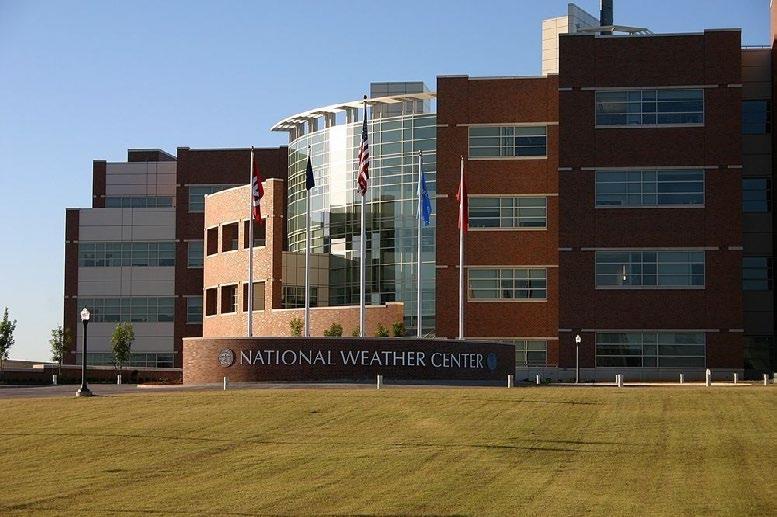
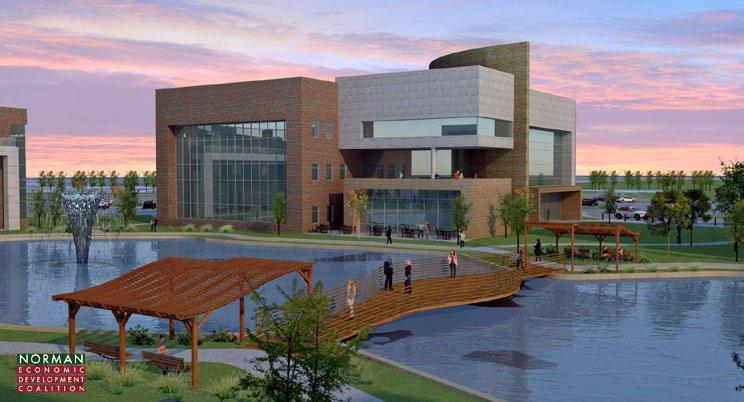
Norman’s location in the heart of America alleviates travel to either coast and provides Norman with connections to more than 80 million people within a 500-mile radius. Positioning on the southern edge of the Oklahoma City metropolitan area also enables Norman to access supplementary human capital from the region’s population of 1.4 million residents. Norman’s central location at the crossroads of I-35 and I-40, two major interstates, and rail service that runs through Norman, plays a dynamic role as well. The nearby Will Rogers World Airport services direct flights to all major cities across the country. The University of Oklahoma, located in Norman, has been ranked as having the #1 Aviation program in the US by FLYING Magazine. Also, #1 Meteorology Program in the US by OutstandingColleges.com
Target industries for Norman include Aerospace, Professional Services, Information Services, Retail, Manufacturing, Weather and Radar. For more information on Norman, please contact the Norman Economic Development Coalition at 405-573-1900 or visit www.selectnorman.com
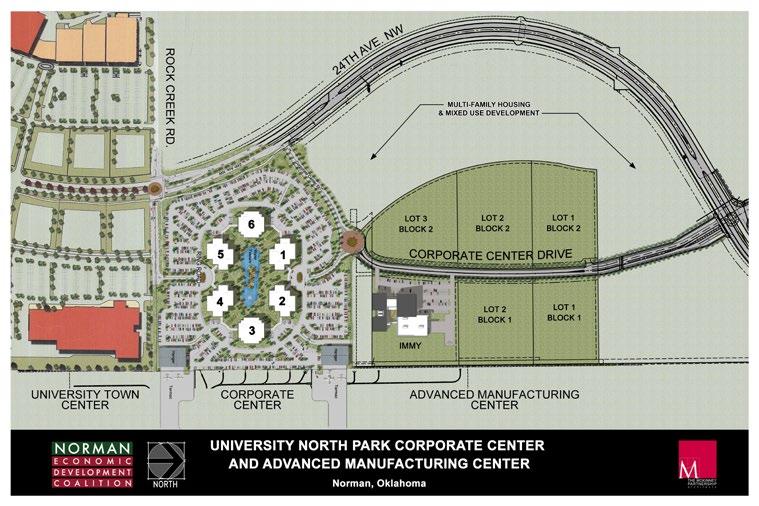
























When census numbers were released in 2020, it gave hard proof that the investments made were getting a big ROI. Oklahoma City has grown to be the 20th largest city in the U.S. Even more so, OKC was one of just 14 cities in the country to add more than 100,000 new residents between 2010 and 2020.
Not a community which rests on its laurels, Oklahoma City is currently in the beginning stages of implementation for the fourth iteration of its groundbreaking Metropolitan Area Projects (MAPS) initiative. MAPS are temporary sales tax initiatives that have previously funded quality-of-life projects like a downtown canal, 70-acre downtown park, convention center, the arena that would later become home to the Oklahoma City Thunder, a downtown whitewater rafting facility, school improvements and much more.
A rapidly growing population created new needs for Oklahoma City, and so the aim of MAPS 4 pivoted to meet those needs.
Since the early 1990s, Oklahoma City has been a community where the business community, city government and citizens have partnered to invest in the city’s quality of life. Through one-of-a-kind sales tax initiatives (MAPS), becoming a “Big League City” through the recruitment of the NBA to Oklahoma City and buying a former GM plant for reuse when the major employer shut its doors, the OKC community has spent the past 30 years creating a place people want to live and employers want to locate.
MAPS 4 will inject nearly $1 billion into the human needs of the community with youth centers, mental health and addiction treatment facilities, affordable housing to combat homelessness and more. It will also feature traditional quality-of-life investments like parks, transit, sidewalks and a multipurpose outdoor stadium.
Economic diversification has also been a key ingredient to Oklahoma City’s historic population rise. For most of its history, Oklahoma City was known as an energy-reliant economy. While the energy sector is still a critical part of Oklahoma City’s economic engine, concerted efforts from business and city leadership over the past 20 years have led to an environment where sectors such as healthcare, distribution, manufacturing, shared service operations, bioscience and aviation are flourishing.
Aviation is a great example of this success. Today, Oklahoma City is home to more than 290 aerospace firms employing 43,250 workers. In the past five years, the number of aerospace establishments has grown by 23% and employment by 18%.
Bioscience is also an industry the community has invested in heavily to great reward.
In September, the Oklahoma Biotech Innovation Cluster was one of just 21 winners of the Build Back Better Regional Challenge. As a winner, Oklahoma City was awarded $35 million in EDA funding that will rapidly expand the region’s biotechnology cluster, bolstering domestic resiliency within the biopharmaceutical supply chain and making the cluster more globally competitive.
What is the next frontier for Oklahoma City? The business of film and music.
Earlier this fall, the Oklahoma City Film and Creative Industries Office was established. The office will help this emerging industry in the region by marketing Oklahoma City as a location for film and television, supporting the implementation of the Oklahoma City Film Incentive Program, aiding film shoots, serving as a hub and clearing house for film industry workforce training and much more.
Oklahoma City has been recognized nationally as an up-andcoming film destination. MovieMaker magazine named the region #13 on its list of Best Places to Live and Work as a Moviemaker and named Oklahoma City Community College as one of the country’s 40 best film schools.
Please visit www.greateroklahomacity.com or call Greater Oklahoma City at 405-297-8900 for more information.
Broken Arrow has what your company needs to grow and thrive. Thanks to a high concentration of higher education and technical training programs, they have a highly skilled workforce ready for jobs in manufacturing, technology, healthcare, and professional services. They can work with your team to identify business incentive programs managed locally or by the state, from retail development to manufacturing site construction.

Named “the most livable small city in America,” the City of Broken Arrow is located in the northeastern corner of Oklahoma, adjacent to the city of Tulsa. Broken Arrow has a residential population of over 114,000, making it the 4th largest city in the state. With over 1 million people within a 40-mile radius, Broken Arrow offers a vibrant city experience that lives as a suburban, family-oriented community. The city is home to a wide range of businesses and industries. In fact, Broken Arrow is ranked third in its concentration of manufacturers in the state, with over 300 companies engaged in that sector.


Broken Arrow partners with local companies, investing in win-win projects that create jobs and develop public infrastructure. The city recently invested over $6 million in a jobs creation package that helped local company Flight Safety International build a new, state-of-theart 375,000 square-foot facility that also included additional public infrastructure.
Broken Arrow offers easy access to transportation and distribution resources such as air service, highways, and port. The city is easily connected to the world via the Tulsa International Airport (TUL), just 20 minutes away with non-stop flights to over a dozen major airport hubs in the U.S., including Atlanta, Chicago, Dallas/Fort Worth, and Los Angeles. There are three more regional airports within 50 miles.
Broken Arrow is built on innovation. With a long history in manufacturing, their growing community of nearly 300 manufacturing companies and more than 6,000 employees produce products from heat exchangers and flight simulators to medical-grade glass and food manufacturing.
Over 300 Oklahoma-based companies provide parts and services to one of broken Arrow’s top employers, Flight Safety International, supporting the local economy with jobs. The New York based company designs and manufactures full-flight simulators for commercial, government, and military organizations.
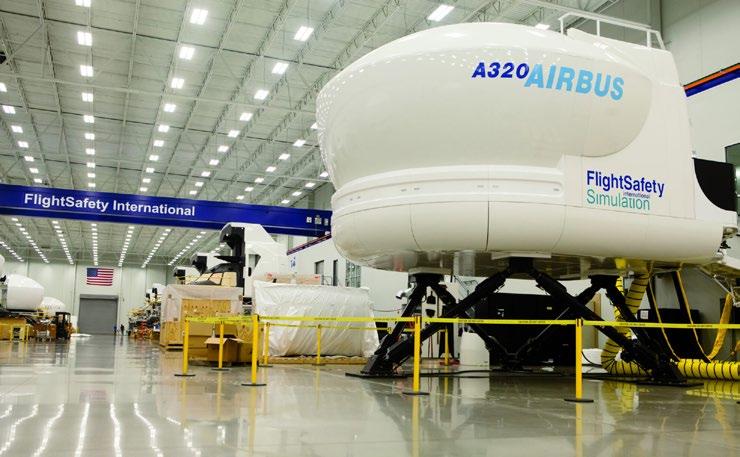
Broken Arrow is home to a wide range of healthcare facilities and



social services agencies, from full-service hospitals, primary doctors, specialty medicine clinics, nursing homes, home health care services and outpatient surgery centers. The primary hospital is Ascension St. John Broken Arrow, which was recently awarded a five-star rating.
Their growing retail sector not only creates new jobs in the community, but also provides a varied and modern shopping experience for their residents, ranging from downtown boutique shops to luxury shopping destinations.
For more information on the many opportunities in Broken Arrow, please contact the Broken Arrow Economic Development Corporation
Centered between Canada and Mexico, and located in the middle of the U.S., Arkansas is strategically located to reach tens of millions of people easily and cost-efficiently. Its unemployment rate consistently ranks below the national average, and 44 campuses of higher learning result in an educated workforce enriched by long-term training and primed for the 21st century challenges.
......................................................................................
On any given day in Arkansas, they’re curating the world’s largest private database and operating one of the nation’s largest truckload carriers, while commanding the world’s dominant retail empire. Home to four Fortune 500 companies and more than 141 international corporations, Arkansas is an industry melting-pot from which one success builds on another.
Their unique blend of industries connects you to a lucrative index of resources, talent, and decision-makers. Aerospace and aviation represent Arkansas’ #1 export, and they’re home to nearly 170 well-known aerospace and defense companies that include MRO, component parts, completion centers, and defense contractors as well as the Little Rock Air Force Base. The state is also home to the Highland Industrial Park, one of the nation’s fastest growing defense corridors,
with companies like Aerojet Rocketdyne, Esterline, Lockheed Martin and Raytheon.
Arkansas knows the food and agribusiness industry. They’re home to Tyson Foods, one of the world’s largest food companies, and manufacturing facilities for some of top companies in the industry, including PepsiCo, Nestle, JBS USA, Kraft Heinz, and many others. Arkansas is also an agricultural leader, producing 49% of all the rice in the U.S.
In the technology sector, Arkansas is rising. With the third-lowest cost of living in the country and business incentives for technologybased organizations, the state is attracting companies from around the world and bringing in a skilled workforce to fill high-tech jobs in cybersecurity, fintech, retail, supply chain and more.

Arkansas is home to the world’s largest retailer – Walmart – and seven other companies on Fortune magazine’s list of the largest 1,000 companies in the U.S. Home to corporate leaders in retail, transportation, food processing and oil, their economy is as diverse as their workforce.
In Arkansas, the metals industry employs over 22,000 people and accounts for 13.6% of total manufacturing. Mississippi County boasts the 2nd largest capacity for steel production in the nation. Other key industries in Arkansas include timber & forest products, firearms &



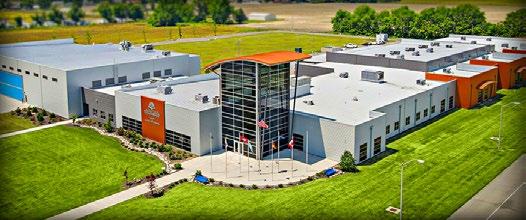







ammunition, distribution & logistics, and transportation equipment.
For more information on Arkansas, please contact the Arkansas Economic Development Commission at 501-352-1431 or visit www. arkansasedc.com
Southern hospitality is our way of life. Our greatest industry is hard work. For many generations Northeast Arkansas has been authentically agricultural from harvesting of the timber to thousands of acres of crop land. Families were raised together and worked together. Today the landscape remains mostly agricultural however because of the logistical advantages of road, rail and river infrastructure and their accessibility the area has for the last 3 decades been an ideal location for steel manufacturing and processing accounting for over 35% of employment. The latest mega project announcement of US Steel investing $3B and hiring 900 workers was just one of many. There are upstream and downstream customers that are also growing in response to the increase in demand. Steel manufacturing and fabrication in Mississippi County is leading the world, not only for volume but for innovation and sustainability.
With 40,000 people living in the county our focus is aimed toward growing our population base and maintaining a strong workforce pipeline. Arkansas Northeastern College and the Arkansas Division of Workforce Services works closely with existing and incoming industry on job profiling, pre-employment screening, pre-employment training, upskill training and certifications related to industrial applications.
A rich and diverse lifestyle and close-knit community awaits. From the larger dual county seats of Blytheville and Osceola, which offer a thriving steel industry and strong business climate to smaller communities like the culturally rich and quiet towns of Manila and Wilson, Mississippi County delivers numerous benefits for both its businesses and residents. With a low cost of living and the highest wages in the state. The industries are partnering to incentivize workers to Work Here, Live Here, Thrive Here! The program is aimed toward encouraging families to live in the community they work in. The goal of the program is to increase the wealth of the economy as a whole and to grow the productivity and programming for children.
The historic town of Camden is located on the Ouachita River in the heart of the Arkansas’ timber basket in South Central Arkansas. Steeped in its heritage Camden offers plenty of exciting opportunities for the history buff or outdoor enthusiast. From our historic national registry properties including the McCollum Chidester House, to our nearby state parks-White Oak Lake and Poison Spring, Camden has plenty to see and do. Rich in Civil War history because of the Battle of Poison Spring, Camden also is home to one of the few remaining historic Freedman Bureau offices in existence. Hunting and fishing are favorite pastimes in our area. If you prefer-take in a round of golf, a
tennis match or simply a walk or bike ride on “The Trace”.
Our community offers some of the best restaurant possibilities in South Arkansas, from upscale dining at the Postmasters Grill, a restored historic post office, to Native Dog Brewing, a locally owned brew pub with a view of the Ouachita River.
Volunteers enjoy working with our local festivals which include the annual Daffodil festival, Barn Sale Craft Fair and First Fridays downtown street festival.
Camden is proud of its Aerospace & Defense industry base which touts notable industries such as: Lockheed Martin, Aerojet Rocketdyne, General Dynamics, and Raytheon.
SAU Tech provides two-year associate degrees and partners with local industry on workforce training.
Ouachita County Medical Center offers excellent health care for our residents with a heart Cath lab, chemical dependency unit, ICU and ER in a setting recognized as one of Arkansas safest hospitals

Marion is situated in a prime location to service the entire U.S. in a fast, efficient manner. With easy access to rail, river, road, and air outlets, it has multiple transportation options to guarantee fast delivery of your goods.
Located just minutes away from the Memphis International Airport, and with easy access to I-55 and I-40, it offers the benefits of being close to Memphis without the day-to-day big city hassle.
Marion is ideally situated to service a 1,000,000-plus trade area population. In addition to local residents, there is a substantial pool of regional consumers located within a 60-minute drive of Marion. Marion also has a 100,000-plus daily traffic count.
An essential component of a successful community is a well-trained workforce. Marion is fortunate to have a large labor shed and excellent training opportunities that give you a variety of employee candidates from which to choose. Marion is five minutes away from Arkansas State University (ASU) Mid-South, 60 minutes from Arkansas State in Jonesboro, and multiple higher education options just minutes away in Memphis.
ASU Mid-South offers various technical programs such as diesel maintenance, welding technology, aviation technology, nursing assistant, respiratory therapy, digital media, emergency technician, and others. The progressive institution has proven experience in developing training programs for existing or new industry. Marion is part of the Memphis MSA (Metropolitan Statistical Area) and the region

has excellent resources in education and specialized training that result in lower unemployment rates and better lives for its citizens. Crittenden County also achieved the ACT Work Ready Communities (WRC) certification in 2019. WRC empowers states, regions and counties with data, processes, and tools that drive economic growth.
experienced the 1865 steamboat explosion on the Mississippi River. The event is known as “The Greatest Maritime Disaster in U.S. History.” Nearby, lakes provide the perfect spot for the serious or not-so-serious fisherman. Marion has caught the attention of the film industry over the years. Filmmakers were so impressed with the area that filming of movies such as Great Balls of Fire, The Client, The Firm, Separated by Murder, and The Pained House has taken place in Marion. Not only does Marion offer a unique mix of attractions, but it’s only 8 miles away from the Memphis waterfront.
For more information on all the opportunities that Marion has to offer, please contact the Marion Chamber of Commerce at 870-7396041 or visit their website at www.chamber@marionarkansas.org
.....................................................................................
According to the Sperling’s Best Places website, Marion’s overall cost of living places 7.3% under the national average and 8.3% over the Arkansas state average. Marion has a median income of $73,190 and a median age of 36.
Enjoy a change of pace in Marion where history is alive and well. Marion offers a visit into the Old South Delta region of Arkansas where farming is still king, and a tractor always has the right-of-way. History buffs will enjoy local Civil War sites such as Mound City, burned down by the Union army, then relocated to be built on top of a Mississippi Indian Cultural Mound. Marion is home to the Sultan Disaster Museum which serves to memorialize and commemorate those who
Siloam Springs, located in northwest Arkansas, presents a vibrant business environment across a variety of retail, commercial and industrial activity. The residents and workforce provide high quality markets for many types of entrepreneurial businesses and industrial concerns.

Located on U.S. Highway 412 at the Oklahoma state line, only 25 minutes west of I-49, U.S. HWY 412 is the number one non-interstate entrance into the state of Arkansas, with daily averages of 27,000 cars per day. 30 minutes from Siloam Springs, Northwest Arkansas Regional Airport (XNA) gives access to suppliers and customers in major hubs and nonstop destinations, including Charlotte, San Francisco, Los Angeles, New York, and many more. Tulsa International Airport (TUL), 90 minutes from Siloam Springs, offers nonstop flights to 17 U.S. cities. Located near the center of the U.S. population, several markets in the Midwest and South are within a half day’s drive, including Kansas City, St. Louis, Dallas-Fort Worth, Memphis, Little Rock, Tulsa, Wichita and Oklahoma City. Cecil Smith Airfield/Siloam Springs Municipal Airport is available for personal or business trips. Rail service is provided by Kansas City Southern Lines, with transportation throughout North America with all Class 1 railroads.

Siloam Springs’ primary/secondary schools, John Brown University, the University of Arkansas, Northwest Arkansas Community College and area technical schools offer high caliber, lifelong educational opportunities. State-of-the-art facilities and access to the latest technology ensures that graduates meet the expectations of the cutting-edge businesses and industries choosing Siloam Springs.
In recent years, Siloam Springs has enjoyed the continued success of its industries and the revitalization of its downtown district and has become a haven for small businesses. The downtown area attracts shoppers and tourists and to the north, the town’s City Lake attracts mountain biking enthusiasts to its challenging downhill courses. To the south, the Siloam Springs Kayak Park on the Illinois River brings adventure seekers from neighboring states.
For more information on all that Siloam Springs has to offer, please contact the City at 479-238-0930 or visit their website at www.whysiloam.com



Ranked as the nation’s “Most Business-Friendly Tax Climate” by Tax Foundation since 2013, plus outstanding transportation options, top-ranked broadband connectivity, well-funded public education, safe neighborhoods, and abundant outdoor space and recreation opportunities, Wyoming businesses and people thrive.
In Wyoming, you can spend less and earn more. There is no corporate state income tax; no personal state income tax; no inventory tax; no franchise tax; no occupation tax; no value-added tax; and Wyoming’s sales tax is 4%, with counties electing up to 3% additional.
Wyoming recognizes that people are what make businesses successful, and the state is committed to investing in its current and future workforce needs. This includes free statewide job-matching system, Wyoming at Work; specialized recruitment and screening services at Workforce Centers across the state; and Workforce Development Training Fund grants provide $4,000-$5,000 per trainee per fiscal year for new positions, skill upgrades, or re-training.
Transportation and logistics also play a major role in business. Strategically located, many routes lead to, through and from Wyoming. A total of 915 miles of interstate crisscross Wyoming. Interstate 15 connects to Los Angeles and Canada and is accessible via I-80 or I-90. Wyoming features 10 commercial airports with final destination service to major cities around the world. Three international airports border the state in Denver, Salt Lake City, and Billings, Montana.
Wyoming has a diverse profile of businesses within the agricultural industry. From beef and lamb producers to local brewers, distillers and coffee roasters, rural communities support these thriving businesses. Local farmers now grow hemp, helping to diversify the production and valueadded ag economy.
With an abundance of natural resources, Wyoming is known as the “Energy State.” Wyoming consistently ranks high in traditional, emerging, and renewable energy sources, including wind. Other target industries in Wyoming include blockchain technology; data centers and IT; manufacturing; outdoor recreation; carbon capture; and DAC technology.
For more information on Wyoming and its opportunities, please contact the Wyoming Business Council at 307-777-2800 or visit www. wyomingbusiness.org




Wyoming is a majorly undiscovered state, limited on people but containing immense beauty. In the heart of Wyoming is Casper, the second-largest city in the state. Casper is known to locals for its accessible community with vital solitude. Casper is a powerful hub for creating, connecting, and constructing a pipeline for businesses to thrive.
“Casper is the true Wyoming experiment. Being in the central part of the state, Casper capitalizes on the unique assets that have long set it apart from other places in Wyoming,” said Justin Farley, CEO of Advance Casper. “Being the regional rail, air, and freight hub encourages local manufacturers and distributors to open their markets to wider audiences and opens the state to diverse industrial opportunities like film, aerospace, defense, technology, and biomedical innovation.” In addition, Casper has the shopping, dining, hospitality, and outdoor adventure essential to the area’s lifestyle.
federal delegates, the business community has more power to thrive and drive the conversation. In addition, Casper offers a favorable business tax environment with 0% personal and corporate income taxes and a minimal 5% local sales tax. Assets like the only Foreign Trade Zone in the state, a well-positioned Qualified Opportunity Zone, a flexible, highly-skilled workforce, and a robust entrepreneurial environment make Casper a prevalent community for business and lifestyle.
Advance Casper, Natrona County’s Economic Development Organization, is the primary resource for businesses looking to grow, move, and sustain in Casper. Copious opportunities and public-private partnerships make economic development accessible and welcoming for the community. Advance Casper has identified three barriers businesses face in the early stages of development or relocation and participates in eliminating those barriers and empowering these businesses for the future.
First, Wyoming, as a state, is preoccupied with extractive industries like oil and natural gas. “By introducing new sectors like aerospace, defense, technology, and biomedical, Casper would experience workforce and manufacturing cross-over, generational workforce retention, and the ability to participate in national proposals competitively,” said Farley. In addition, the logistics to deliver components and finished products under the Foreign Trade Zone designation would be cost-effective for the contractor and strengthen Wyoming’s economy in the long term.
In Wyoming, diversifying the economy has been at the forefront of strategy. With the accessibility to local, state, and
Secondly, “access to capital for early-stage businesses is a challenge, nationally. Advance Casper houses the Invest307 equity crowdfunding platform, which connects investors to local business projects, keeping the money and investment local. Businesses looking to grow can submit project proposals for local investors to participate in, building momentum and attracting larger audiences for their product or service,” said Farley. “In addition, Breakthrough 307, the only organized angel fund in Wyoming, helps high-growth companies with early-stage funding. Through a series of vetting procedures, companies who prove
viable become investment companies in Breakthrough 307.” Advance Casper is a participating investor.
Lastly, Advance Casper is active in unifying community resources that expand Casper’s economic base. Advance Casper provides site selection, incentives, workforce determination, and infrastructure details, so businesses have the relevant information at their fingertips. “Advance Casper advocates and assists on behalf of the businesses regarding business licenses and permits to help companies get going faster. Advance Casper also maintains active involvement with Casper College, [Central Wyoming’s most comprehensive community college] in terms of degree offerings that align with community and business needs, bolstering the workforce pipeline for local businesses and residents. And finally, Advance Casper’s partnership with Visit Casper, the visitor bureau, helps support the local tourism and hospitality industry, crucial to the community,” said Farley. Visit Casper’s efforts to roll out Film Casper will provide vendor, crew, location, and permitting information, making it easy for production companies to film locally, another asset unique to the Casper community.

As business and innovation advance, Casper provides the opportunity to thrive. Though Casper is a small city, it has a mountain town spirit and unique assets that keep it rooted. Creating, connecting, and constructing a pipeline continually reinforce why Casper makes business sense--- because Casper is business-driven and community-inspired.
To learn more, please visit AdvanceCasper.com or local information site, ChooseCPR.com.


Cheyenne has invested wisely and generously in quality of life initiatives. Without the major urban reconstruction and remediation costs of larger cities, Cheyenne is able to focus its resources on improvements for the future: a $1.46 million expansion to the Greater Cheyenne Greenway, expanded parks, downtown historic districts, and new schools and community college facilities.
Cheyenne is a location of choice partly because of where it is – near the geographical and time center of the North American continent. Cheyenne manages a transportation triple play with the intersection of Interstates 80 and 25, two major railroads and Denver International Airport (DIA) 90 minutes away.
At the northern end of the Rocky Mountain Front Range Urban Corridor, Cheyenne benefits from its position as the capital of Wyoming as well as its proximity to the Front Range cities of Colorado with their dense populations, diverse employment and educational infrastructure. At the same time, Cheyenne enjoys a favorable tax and regulatory climate, low cost-of-doing business, and world-class communications.
Cheyenne is also the home to FE Warren Air Force Base. Warren Air Force Base is a terrific source of an educated and disciplined workforce made up of current and retired military enlisted and officers. Wyoming is a right-to-work state with employer-friendly labor rates and laws.
For more information, call Cheyenne LEADS at 800-255-0742 or visit www.cheyenneleads.org. X www.cheyenneleads.org

MONTGOMERY, AL, – Governor Kay Ivey announced that First Solar Inc. plans to invest $1.1 billion to establish a photovoltaic (PV) solar module manufacturing facility in Lawrence County, creating over 700 new jobs in North Alabama. The new factory is part of the company’s previously announced investment in scaling its American manufacturing footprint to over 10 gigawatts (GW) by 2025.
The facility in Lawrence County’s Mallard Fox West Industrial Complex is expected to be commissioned in 2025, with a planned annual capacity of 3.5 GW. The new fully vertically integrated facility will join three factories in Ohio, including one that will come online in the first half of 2023, to form First Solar’s expanded domestic manufacturing footprint.
“First Solar is a world-class manufacturer, and its solar modules are poised to play an increasingly important role in U.S. energy self-sufficiency,” said Governor Ivey. “I’m thrilled to see the company’s growth project headed to Lawrence County because I know it will create good jobs and have a major economic impact on this rural region.”
The Alabama facility is expected to advance a strategic push by the company to scale its U.S. manufacturing base in support of the effort to decarbonize the American economy and achieve self-sufficiency in reliable and competitive renewable energy technologies.
“This facility, along with its sister factories in Ohio, will form part of the industrial foundation that helps ensure this transition is powered by American innovation and ingenuity,” said CEO of First Solar Mark Widmar.
Designed and developed at its research and development (R&D) centers in California and Ohio, First Solar’s advanced thin film PV modules set industry benchmarks for quality, durability, reliability,
design and environmental performance.
“Our commitment to Responsible Solar includes operating facilities that are among the cleanest, safest and most diverse in the country, and we’re pleased to bring our model of responsible solar manufacturing to Alabama,” added Widmar. “We are proud of the role that this facility will play in creating stable, good-paying manufacturing jobs in the state, demonstrating the economic and social value that clean energy can deliver.”
Tempe, Arizona-headquartered First Solar is unique among the world’s 10 largest solar manufacturers for being the only U.S.-headquartered company and for not manufacturing in China.
Muskogee, OK – The Muskogee City-County Port Authority has been awarded a Port Infrastructure Development Program Grant (PIDP) from the U.S. Department of Transportation for $23.9 million to address infrastructure needs at Port Muskogee in Muskogee County. In addition to the PIDP, the authority will receive $10 million, which was approved in a slate of bills approved by the Oklahoma State Legislature in October via a special session.
The PIDP is a discretionary grant program administered by the U.S. Maritime Administration. Funds for the PIDP are awarded on a competitive basis to projects that improve the safety, efficiency, or reliability of the movement of goods into, out of, around, or within a port. In FY2022, the Bipartisan Infrastructure Law (BIL) appropriated $450 million to the PIDP. An additional $234 million was made available to the program under FY2022 Consolidated Appropriations Act. Therefore, a total of $684,310,000 of funding
was available to make awards under the FY 2022 PIDP grant program.
“Today is a monumental win for Muskogee. This $23.9 million grant will bring transformational change as Port Muskogee continues to serve northeast Oklahoma and global industries, ensuring Muskogee remains a global port city for generations to come,” Port Director Kimbra Scott said. “We are grateful for the trust from U.S. DOT and all who supported our grant application at the federal, state and local levels. The Port is well-positioned as an economic engine for Muskogee, northeast Oklahoma and its citizens.”
“This significant funding for Port Muskogee will have long-lasting, positive impact on northeast Oklahoma. It will greatly enhance the viability of an already attractive industrial complex and boost economic growth in Muskogee and the surrounding region for many years to come.” said Brent Kisling, Oklahoma Department of Commerce Executive Director.
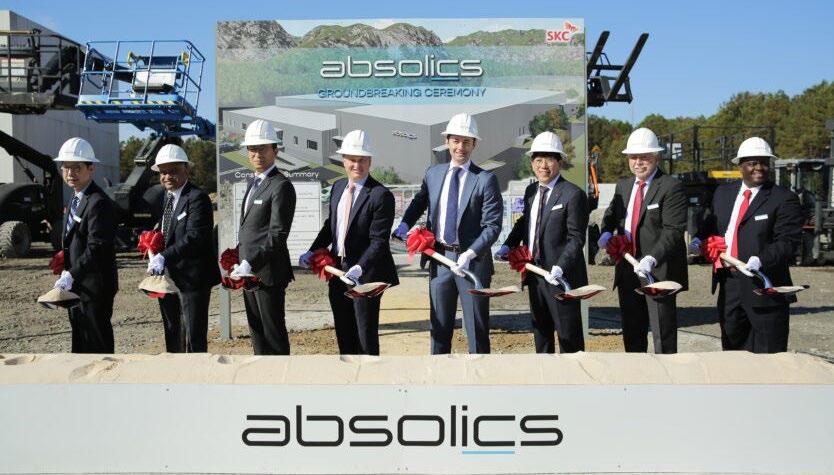
COVINGTON, Ga. - Absolics, Inc., a subsidiary of SKC Co. Ltd., broke ground on a planned $600 million investment in Covington, Ga., for a new manufacturing facility that will supply advanced materials to the U.S. semiconductor industry.
The investment will create more than 400 high-skilled jobs in Georgia and help strengthen the U.S. semiconductor supply chain by manufacturing a new material that supports next-generation computing systems.Absolics’ Georgia site will make a glass substrate – a thin layer of glass on which processing and memory chips can be mounted together to create the brains of a computing system. The material reduces the space required for a multi-chip package, allowing more chips to be packed into a single device.
The glass substrate is considered a breakthrough because it can significantly increase the performance and energy efficiency of chipsets. SKC and Absolics originally developed the technology as part of a research consortium with the Georgia Institute of Technology. Absolics is expected to be the first in the world to mass produce the material.
The planned investment announced at today’s groundbreaking, attended by officials including Senator Jon Ossoff and Georgia Economic Development Commissioner Pat Wilson, represents an increase from the $473 million originally announced in October 2021. SKC and Absolics raised projections for the investment based on the need for more advanced manufacturing equipment to meet anticipated demand.
“Absolics will be an integral part of the semiconductor ecosystem
in the U.S.,” said Dr. Woncheol Park, President and Chief Executive Officer of SKC. “We are pleased to build a factory and create hundreds of jobs that will have a positive impact on the city of Covington and the State of Georgia.”
“I am working every day to bring jobs and business to the State of Georgia,” said Senator Ossoff. “This new plant will create Georgia jobs, support U.S. national security, and bring more advanced manufacturing to our state.”
“The development of Absolics is an exciting opportunity to grow the semiconductor industry in Georgia and the entire United States –a need that is growing daily as we plan for an increasingly electrified future,” said Georgia Department of Economic Development Commissioner Pat Wilson. “Located at SKC’s existing campus in Covington, this new venture came about through research conducted at Georgia Tech, and it is the perfect example of how the State of Georgia is participating in the innovative solutions of the future. As we continue to build on the long-term relationship between the State of Georgia and Korea, and our shared success with SK Group in particular, we thank SKC for their commitment to our partnership. Congratulations to everyone involved with this project!”
Absolics plans to build the Georgia facility in two phases. The first phase, planned for completion by the end of 2023, will be a $240 million investment expected to create 140 jobs and focus on smallvolume manufacturing. Mass production in this facility is expected to start in the second quarter of 2024. The second phase is expected to be an additional $360 million investment that creates another 270 jobs and ramps up to high-volume manufacturing. This phase is anticipated to be completed over the next 3-5 years.
RICHMOND, VA - Governor Glenn Youngkin announced that World Class Distribution, Inc. (WCD Inc.), a distribution, warehousing, and cold storage network company, will invest $275 million to establish an operation in Caroline County. The company will construct a 1.2 millionsquare-foot distribution facility in the Caroline 95 Logistics Park in Ruther Glen. Virginia successfully competed with North Carolina for the project, which will create 745 new jobs.
“Today’s announcement is an important step forward as we focus on returning more Virginians to the workforce, and I thank World Class Distribution for creating 745 new, high-quality jobs in the Commonwealth,” said Governor Glenn Youngkin. “Virginia’s extensive transportation infrastructure is the cornerstone of our position as a leader in supply chain management, and World Class Distribution’s major investment will contribute to the Commonwealth’s success in this important industry.”
“Caroline County’s strategic location and proximity to major highways will position World Class Distribution for continued growth in the U.S. market, and we are excited to welcome the company’s new 1.2 million-square-foot distribution center,” said Secretary of Commerce and Trade Caren Merrick. “World-class logistics, a strong workforce, and effective collaboration are the hallmarks of economic development in Virginia, and this significant project will make the Commonwealth even more attractive for additional investments in our logistics sector.”
“Caroline County is proud to be the host community for World Class Distribution’s $275 Million distribution center project. World Class Distribution is another outstanding company with a great future in
BALTIMORE, MD — Governor Larry Hogan announced that MilliporeSigma, an international biosciences company, is growing its presence in Montgomery County with a $286 million investment to expand its biosafety testing capacity.
The company, known locally as BioReliance Corporation, currently has five locations in Rockville and is planning to consolidate in a new 250,000-square-foot facility at 9820 Darnestown Road at the Alexandria Center® at Traville Gateway campus, which is being developed and operated by Alexandria Real Estate Equities, Inc. MilliporeSigma will maintain one additional facility at 9630 Medical Center Drive and will retain at least 600 full-time employees during the expansion, while creating more than 500 new jobs over the next four years.
“Maryland has built one of the nation’s strongest life sciences industries, and having MilliporeSigma reinvest in its Maryland biosafety facility will bring hundreds of more jobs to the Montgomery County community and continue to grow the region’s innovative workforce,” said Governor Hogan. “Our administration has made expanding the state’s life sciences and biotechnology research workforce a priority, and the progress our life sciences industry has made in the last eight years is another sign that Maryland is open for business.”
MilliporeSigma is the U.S. and Canada life science business of Merck KGaA, Darmstadt, Germany, a leading science and technology company. This is the largest investment in contract testing in the history of Merck KGaA, Darmstadt, Germany.
Caroline County,” said Reginald Underwood, Chairman, Caroline County Board of Supervisors from the Reedy Church District. “Caroline County is the right place for continued business investment with ready-to-go sites, new facilities designed, and infrastructure in place and expanding, all while preserving the beautiful rural character of the community.”
“This announcement is incredible news for Virginia’s economy and workforce,” said Congressman Rob Wittman. “As our nation’s economy continues to recover, these developments are the exact steps we need to take to strengthen the Commonwealth of Virginia’s economy and add more jobs. I am grateful for Governor Youngkin’s leadership in securing this economic investment from World Class Distribution Inc., and I look forward to seeing how this will benefit the Commonwealth of Virginia.”
“World Class Distribution’s $275 million investment, which will bring over 700 new jobs to our region, is fantastic news for Caroline County and Virginia,” said Senator Ryan McDougle. “This is the latest in a string of business ventures that have been locating and expanding here, strengthening our economy. I thank World Class Distribution for choosing Caroline County for this new distribution facility and congratulate everyone who made this exciting announcement possible.”
The Virginia Economic Development Partnership worked with Caroline County to secure the project for Virginia. Governor Youngkin approved a $3 million grant from the Commonwealth’s Opportunity Fund to assist Caroline County with the project. World Class Distribution is eligible to receive benefits from the Major Business Facility Job Tax Credit for new, full-time jobs created. VEDP is working with the Virginia Department of Transportation to determine eligibility for funding through the Economic Development Access Road program.
MilliporeSigma has held a presence in Maryland for more than 75 years and is expanding its Mid Atlantic footprint due to Montgomery County’s ideal East Coast location and accessibility to the state’s highly trained and technical workforce. Biosafety testing and analytical development are critical and fundamental requirements of the drug development and commercialization process to ensure the safety of medicines.
“Our full contract testing services facility in Rockville will continue to serve as a hub for innovation to address current challenges and meet tomorrow’s demands,” said Benoit Gourdier, head of contract testing services at MilliporeSigma. “We look forward to continuing to grow here and to giving back to the Montgomery County community as we transform patients’ lives by ensuring the safety of the world’s medicine.”
To assist with the expansion, MilliporeSigma is eligible for a $1 million conditional loan through the Maryland Department of Commerce’s Advantage Maryland (MEDAAF) program. Montgomery County is providing a $100,000 incentive package through a grant convertible to a loan under its Economic Development Fund. MilliporeSigma is also eligible for various state and local tax credits.
“We are truly thankful for MilliporeSigma’s dedication to doing business in Maryland,” said Maryland Commerce Secretary Mike Gill. “Building this impressive new space in Rockville ensures the company will continue to flourish in Montgomery County for years to come.”
“We welcome the expansion of MilliporeSigma in Rockville and are proud the company recognizes that its business can continue to grow significantly here in Montgomery County,” said Montgomery County Executive Marc Elrich. “Their work helps ensure the safety of medicines developed in the county and around the world.”
Clarksville, TN – LG Chem announced the signing of a memorandum of understanding (MOU) with the state of Tennessee to establish a new cathode manufacturing facility in Clarksville with an investment of more than USD 3 billion.
The new plant in Clarksville, Tennessee will be the largest of its kind in the United States, covering 420 acres with a production target of 120,000 tons of cathode material annually by 2027 to power batteries in 1.2 million pure electric vehicles with a range of 310 miles (500 km) per charge. Construction of the plant will begin in the first quarter of next year with mass production to start in the second half of 2025. The Tennessee site will play a critical role in LG Chem’s strategy to increase its battery materials business including cathode material fourfold from KRW 5 trillion in 2022 to KRW 20 trillion by 2027.

The signing ceremony was attended by Tennessee Governor Bill Lee, Department of Economic and Community Development Commissioner Stuart McWhorter and LG Chem CEO Shin Hak-Cheol, among others.
For LG Chem, Tennessee was the best choice due to its proximity to key customers, ease of transporting raw materials and active cooperation of the state and local governments. The Tennessee facility allows LG Chem to proactively address the changing dynamics of the global battery material market and with legislation such as the Inflation Reduction Act (IRA). In addition to the benefits realized by investing in manufacturing on U.S. soil, LG Chem envisions the Tennessee site being the supply chain hub where material and recycling partners work together to supply global customers.
The new facility will produce advanced NCMA cathode materials containing nickel, cobalt, manganese and aluminum for next-generation EV batteries with improved battery capacity and stability. NCMA cathode materials are among the most critical ingredients
for determining the battery capacity and life of electric vehicles. The Tennessee plant will feature LG Chem’s most advanced production technology including the ability to produce more than 10,000 tons of cathode material per line, the industry’s highest. LG Chem applied this technology for the first time to its fourth cathode manufacturing site in Cheongju, South Korea with much success. The company also plans to implement its smart factory technology in Tennessee to automate the entire production process and establish a quality analysis and control system that will be the benchmark for all other cathode plants in the world.
The new facility will be designed with the environment and future needs of clean energy in mind. LG Chem will collaborate with power suppliers in Tennessee to respond to the demands of customers, including battery and electric vehicle manufacturers, for more renewable energy sources. Operation of the new facility will rely completely on renewable energy provided by solar and hydroelectric power.
“LG Chem’s decision to invest USD 3.2 billion in Clarksville is a testament to Tennessee’s unmatched business climate, skilled workforce and position as a leader in the automotive industry,” said Tennessee Governor Lee. “I thank this company for creating more than 850 new jobs to provide opportunity to Tennesseans across Montgomery County.”
Commissioner McWhorter said, “This is a big win for Tennessee and Montgomery County. LG Chem’s decision to locate its new cathode manufacturing facility in Clarksville underscores Tennessee’s growing profile as a hub for U.S. and global companies. As we continue our efforts to attract companies in the automotive industry, we are focused on supporting companies that boost Tennessee’s presence in the EV space. I appreciate LG Chem for its substantial investment in Clarksville and look forward to building a successful partnership with the company in the years ahead.”
Governor Kevin Stitt and local leaders announced that Premium Aerospace Center (PAC) will locate its international headquarters at the Oklahoma Air & Space Port complex in Burns Flat, Okla. PAC will invest several million dollars to renovate and expand two existing hangars and build a third hangar at the facility.
“Seeing this project come to fruition has been a goal of mine since we met with Premium Aerospace in Mexico last fall,” Gov. Stitt said. “The investments we are making in this site, and several others, will make Oklahoma a prime target for foreign investment and high-quality jobs. This announcement from PAC further solidifies Oklahoma as the aerospace MRO Capital of the World.”
PAC signed a long-term lease and business development agreement at the aerospace industrial park and FAA-licensed spaceport at the Clinton-Sherman Airport. The renovated hangars

and new hangar will accommodate 737 and larger aircraft for paint and interior remodeling for airline companies with strategies to further expand its business model. The company estimates as many as 600 new jobs to be added once the hangars are complete.
“We were impressed by Governor Stitt’s enthusiasm and warm invitation to establish our operations in Oklahoma,” said Lucas Conde, PAC General Manager. “The infrastructure investment by the State and the Department of Commerce and the Governor’s ‘can-do’ attitude solidified our decision to make our investment in Oklahoma.”
PAC initially plans to hire upward of 30 employees with plans for future investments exceeding $120 million, over the next few years, and a total job creation of between 450 to 600 employees. PAC is working with Western Technology Center and local workforce development leaders to develop a skilled technical workforce to support its operations and growth plans.
MOBILE, Ala. - The Mobile Chamber is proud to announce an expansion project at the existing Great Southern Wood treatment facility in Mobile County.
Great Southern Wood produces and distributes appearance-grade, pressure-treated lumber marketed for decks, fences and landscaping projects under the YellaWood brand; other brands include N-Durz, FlameFreez and RainWood.
The nearly $14 million expansion project will improve traffic flow, storage, and their ability to process imports and exports through the Port of Mobile. It will create 12 new jobs and retain 78 current positions.
Jimmy Rane, Great Southern’s founder, president and CEO, said, “This expansion in Mobile is the next step in our long-term commitment to Mobile and the entire Gulf Coast region. Very early in our company’s history, we identified Mobile and the Gulf Coast region as a key growth area. As a result, we built our second treating plant in Mobile County in 1976. Since then, we’ve experienced consistent growth, and this new investment of roughly $13.7 million will help set the path to future growth in the years to come. The project will expand the current footprint of the facility and will allow for improved traffic flow and therefore increased safety. In addition, the project will allow greater expansion of our distribution products business through increased storage as well as improved ability to warehouse, store and process import and export material through the Port of Mobile. To help accommodate our growth, the existing office and manufacturing space at the location will be renovated, and we also expect our workforce to increase.”
Rane continued, “We have a very strong leadership team and workforce in Mobile, and this expansion makes a strong statement about our ongoing commitment to our team, the Mobile community and the residential, construction and industrial markets we serve
from this facility. We couldn’t be more excited about this expansion— not only what it means for our company, but what it means for Mobile and the Gulf Coast region as well.”
The Great Southern Wood expansion builds on the Mobile area’s growing logistics and distribution network.
“It’s all about being more efficient when getting products to suppliers,” said Mobile Chamber President & CEO Bradley Byrne. “This is not only an investment into the Great Southern Wood facility, but an investment into the growth and expansion of the port.”
“Mobile County Commission is pleased that Great Southern Wood’s Treatment Facility expansion project will infuse construction dollars, retain jobs and create new jobs in Mobile County. Decisions to expand, like this one, demonstrate Mobile County’s quality workforce and growing logistics capacity,” said District 3 Commissioner Randall Dueitt.
Alabama Power has been a strategic partner in this expansion project.
Envision AESC to establish Florence County, SC electric vehicle battery gigafactory $810 million investment will create 1,170 new jobs
COLUMBIA, S.C. – Envision AESC, a world-leading Japanese electric vehicle battery technology company, along with Governor Henry McMaster, announced it will build a state-of-the-art battery cell gigafactory in Florence County. The $810 million investment will create 1,170 new jobs and will support the company’s multi-year partnership with the BMW Group.
“South Carolina has been an automotive manufacturing powerhouse for over 30 years, and Envision AESC’s decision to establish operations in Florence County and to create jobs for thousands of South Carolinians shows that we will continue to be one for years to come,” said Governor Henry McMaster. “We have the workforce, business friendly environment, and the willingness to adapt to industry’s innovation necessary to ensure that companies that choose to do business here will find the success they’re looking for.”
As part of the partnership announced in October, AESC will supply technology-leading battery cells to be used in the next generation electric vehicle models produced at the BMW Group’s Plant Spartanburg. The advanced battery format will result in 20% more energy density than the current generation, reduce charging time and increase range and efficiency for electric vehicles by 30%.
Aligning with the company’s global commitment to sustainability, the new, 30GWh manufacturing plant will be powered by 100% net zero carbon energy. AESC leverages leading net-zero system solutions from across the business, including renewable energy generation, carbon reduction through artificial intelligence of things energy management systems and battery recycling to accelerate
carbon neutrality across the whole battery value chain. The company is also committed to pursuing responsible sources for its critical battery components – cobalt, lithium and nickel – providing full transparency of extraction methods and increasing reliance on recycled materials, which will contribute to a reduction in carbon dioxide emissions from cell production in the new plant.
AESC Group CEO Shoichi Matsumoto said, “Our partnership with Florence County, South Carolina is part of our next phase battery strategy to power next generation EVs in the U.S. This facility is another milestone on our journey to building an electrification network in the U.S. and strengthens our commitment to grow the electrification supply chain while providing high value jobs for the community for years to come. We are making good progress on our ambition to create high-performance, longer-range batteries for a diverse range of automotive manufacturers worldwide to support the EV transition and we’re excited to bring Florence County on this journey with us.”
Located in an 870-acre Technology and Commerce Park in Florence, with convenient proximity to the interstate and Inland Port Dillon, the Florence plant will encompass approximately 1.5 million square feet. The new battery plant builds on AESC’s existing United States network that includes a battery manufacturing plant in Tennessee and a plant under construction in Kentucky. Collectively, when complete, these plants will provide up to 70GWh capacity nationally and power the United States’ shift to electric vehicles.
Individuals interested in joining the AESC team should visit readySC’s recruitment website to explore opportunities. Companies interested in becoming a supplier for the company should complete S.C. Commerce’s online interest form.
battery cell production in August, and the Lansing Delta Township facility in Michigan is under construction and will begin production in late 2024.
NASHVILLE, Tenn. – Tennessee Gov. Bill Lee and Department of Economic and Community Development Commissioner Stuart McWhorter announced Ultium Cells LLC, a joint venture of LG Energy Solution and General Motors, will expand its Spring Hill, Tennessee, battery cell manufacturing operations.
The project represents a $275 million investment by Ultium Cells, which is in addition to the $2.3 billion investment announced in April 2021, and is expected to create 400 additional jobs. Once the facility is fully operational, Ultium Cells is expected to employ a workforce of 1,700 in Maury County.
Ultium Cells will increase battery cell production by more than 40 percent, from 35 gigawatt-hours to 50 GWh. The Tennessee facility will supply battery cells to General Motors’ Spring Hill assembly plant for production of the Cadillac LYRIQ, the first electric vehicle produced at the plant, and other GM Ultium Platform-based electric vehicles. Production at the 2.8-million-square-foot facility will begin in late 2023.
The Tennessee site joins two other Ultium Cells battery cell manufacturing sites in Ohio and Michigan. The Warren, Ohio, facility began
Once all three facilities are at full production capacity later this decade, Ultium Cells expects to have more than 130 GWh of battery cell capacity in total. Ultium Cells will provide battery cell capacity to support GM’s North American electric vehicle assembly capacity of more than one million units by mid-decade, while supporting GM’s plans to supply other automotive companies and industries including rail, aerospace, heavy trucking and marine customers.
Tennessee has made significant strides in electric vehicle manufacturing with investments from companies like General Motors and LG Energy Solution. Since 2017, companies have committed to create nearly 12,000 new jobs and invested $16 billion in Tennessee through EV-related projects. Additionally, with more than 180,000 electric vehicles produced in the state since 2013, Tennessee ranks No. 1 in the Southeast for electric vehicle manufacturing.
Tennessee is also quickly becoming a leader in the domestic manufacturing of critical materials used to make lithium-ion batteries, such as lithium, cobalt, nickel and graphite. Since 2018, TNECD has announced more than 5,900 new job commitments and roughly $10 billion in capital investment related to EV battery manufacturing or the EV battery supply chain.
Governor Lee, Commissioner McWhorter Announce Ultium Cells to Invest $275 Million to Expand Battery Cell Manufacturing Plant in Spring Hill, Tennessee
ALABAMA

Cullman Economic Development Agency
Dale Greer
P.O. Box 1009, Cullman, AL 35056 256-739-1891 daleg@cullmaneda.org www.cullmaneda.org
Arizona Regional Economic Develoment


Mignonne Hollis, Executive Director
750 E. Bartow Drive Suite 16 Sierra Vista, AZ 85635 520-458-6948 hollism@aredf.org www.aredf.org
Etowah Economic Alliance

Shane Ellison
800 Forrest Avenue Suite 220E Gadsden, AL 35901 256-456-9938 www.littlecanoecreek.com
Gadsden Industrial Development Authority
David Hooks, Executive Director 1 Commerce Square Gadsden, AL 35901 256-543-9423 davidhooks@gadsdenida.org www.gadsdenida.org


John Saltonstall, AZED Pro Business Retention & Expansion Manager
Economic Vitality Division
City of Flagstaff 211 W. Aspen Avenue Flagstaff, AZ 86001 Office 928-213-2966 Cell 928-606-9430 jsaltonstall@flagstaffaz.gov www.flagstaffaz.gov
Chaffee Crossing
Ivy Owen, Executive Director 7020 Taylor Avenue Fort Smith, AR 72916 479-452-4554 479-452-4566 (f) property@chaffeecrossing.com www.chaffeecrossing.com
City of Eastvale
Gina Gibson-Williams
Economic Development Manager 12363 Limonite Ave. Suite 910 Eastvale, CA 91752 951-703-4425

ggibson-williams@eastvaleca.gov www.eastvaleca.gov
Ouachita Partnership for Economic Development
James Lee Sillman
Executive Director 625 Adams Aveune Camden, AR 71701 870-836-2210 870-836-8899 (f) director@teamcamden.com www.teamcamden.com

City of Moreno Valley Economic Development

Mike Lee
Economic Development Director 14177 Frederick Street Moreno Valley, CA 92553 951-413-3460 edteam@moval.org www.morenovalleybusiness.com
Elmore County Economic Development


Cary Cox
P.O. Box 117, Wetumka , AL 36092 334-514-5843 cary.cox@elmoreeda.com www.elmoreeda.com
HudsonAlpha Institute for Biotechnology
Mary Shirley-Howell
601 Genome Way Huntsville , AL 35806 256-327-9591 mshirleyhowell@hudsonalpha.org www.hudsonalpha.org
Tuscaloosa County Economic Development Authority
Justice Smyth, Executive Director
P.O. Box 2667, Tuscaloosa, AL 35403 205-349-1414 info@tcoeda.com www.tcoeda.com
Pinal Alliance for Economic Growth
Patti King, Executive Mgr. 17235 N. 75th Avenue Suite D-145 Glendale, AZ 85308 520-836-8686 pking@pinalalliance.org www.pinalalliance.org
Salt River Project (SRP)
Karla Moran
P.O. Box 52025 Phoenix, AZ 85072-2025 602-236-2396 Karla.moran@srpnet.com www.powertogrowphx.com
East Arkansas Crossroads Coalition


Mark O’Mell
1790 N. Falls Boulevard, Suite 2 Wynne, AR 72396 870-238-5300 momell@crossroadscoalition.org www.crossroadscoalition.org
City of Ontario Economic Development
Jennifer McLain Hiramoto
Economic Development Director 303 East B Street Ontario, CA 91764 909-395-2295 JHiramoto@ontarioca.gov www.ontariothinksbusiness.com

Mississippi County Economic Development

Clif Chitwood 4701 Memorial Drive Blytheville, AR 72315 870-532-6084 clif@cottontosteel.com www.cottontosteel.com
City of Surprise
Mike Hoover
16000 N Civic Center Plaza Surprise, AZ 85374 623-222-3328 Mike.hoover@surpriseaz.gov www.surpriseaz.gov
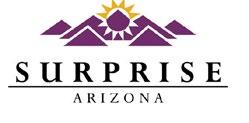
City of Siloam Springs
Don Clark
Community Development Director P.O. Box 80 Siloam Springs , AR 72761 479-238-0930 dclark@siloamsprings.com whysiloam.com



Pepper Russell
36 Executive Park Suite 100 Irvine, CA 92614 949-502-4129 prussell@irvinechamber.com www.irvinechamber.com

City of Canon City
Rick Harrmann
128 Main Street Canon City, CO 81212 719-276-5279 rlharrmann@canoncity.org www.canoncity.org
Kimberly A. Bailey
Economic Development/ Urban Renewal Director 116 S. Main Street Fountain, CO 80817 719-322-2056 kbailey@fountaincolorado.org www.fountaincolorado.org


City of Sanford Bob Turk
Economic Development Director 300 North Park Ave. Sanford, FL 32771 407-688-5015 bob.turk@sanfordfl.gov www.sanfordfl.gov



Robin Brown, Executive Director 122 N. 6th Street Grand Junction, CO 81501 970--245-4332 robin@gjep.org www.gjep.org

Lisa Nicholas
555 South Washington Avenue Titusville, FL 32796-3584 321-567-3774 lisa.nicholas@titusville.com www.YEStitusvilleFL.com
Holmes County Development Commission

Joe Rone, Executive Director 106 E Byrd Avenue Bonifay, FL 32425 850-547-6154 jrone@westflorida.coop hcdc1978@gmail.com www.holmescountyedc.com
Indian River Chamber of Commerce

Helene Caseltine Economic Development Director 1216 21st Street Vero Beach, FL 32960 772-567-3491 helenec@indianrivered.com www.indianrivered.com

Dr. Cynthia Johnson, EDFP Director 13805 58th Street North, Suite 1-200 Clearwater, FL 33760 727-464-7332
cyjohnson@pinellascounty.org www.pced.org
Town of Berlin

Chris Edge Director
240 Kensington Road Berlin, CT 06037 860-828-7005 cedge@town.berlin.ct.us www.town.berlin.ct.us
Kent Economic Partnership
Linda Parkowski
Executive Director 555 Bay Road Dover, DE 19901 302-678-3057 info@ccede.com www.choosecentraldelaware.com

Greater St. Petersburg Area Economic Development Corporation


J.P. DuBuque
President and CEO 100 2nd Ave N Ste 130 St. Petersburg, FL 33701 727-388-2906 jpdubuque@stpeteedc.com StPeteEDC.com/BurgBiz
Haines City Economic Development Council, Inc.
Cyndi Jantomaso, President Post Office Box 3845 Haines City, FL 33845-3845 863-422-2525 863-206-0007 cyndi@hainescityedc.com www.hainescityedc.com
Lake County Economic Growth
Mary Ellen Stern, Executive Director 315 W. Main Street Tavares, FL 32778 352-343-9647 maryellen.stern@lakecountyfl.gov www.lakecountyfl.gov
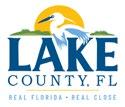
Shannon Ogletree, Executive Director
6491 Caroline Street, Suite 4 Milton, FL 32570-4592 850-623-0174 Shannon@santarosa.fl.gov www.santarosaedo.com
Tallahassee-Leon County Office of Economic Vitality


Cristina Paredes, CEcD, Director
315 S. Calhoun Street, Suite 110 Tallahassee, FL 32301 850-219-1080 Cparedes@OEVforBusiness.org www.oevforbusiness.org

Osceola County David Rodriguez, Economic Development Manager 1 Courthouse Square, Suite 4400 Kissimmee, FL 34741 407-742-0620 407-742-4202 (f) david.rodriguez@osceola.org www.chooseosceola.com www.osceola.org

Artie Jones III
Director of Economic Development 3667 Main Street College Park, GA 30337 404-305-2052 404-305-2057 (f) artiejones@collegeparkga.com www.collegeparkga.com/
Wilmington Economic Development
Jeff Flynn
800 N. French St., 3rd Floor Wilmington, DE 19801 302-576-2128 jflynn@wilmingtonde.gov www.wilmingtonde.gov
Valerie M. Pianta
Economic Development Director 15800 Flight Path Drive Brooksville, FL 34604 352--540-6400 vpianta@hernandocounty.us www.hernandobusiness.com


Pasco Economic Development Council

Bill Cronin, President & CEO 16506 Pointe Village Drive, Suite 101 Lutz, FL 33558 813-926-0827 813-926-0829 (f) bcronin@pascoedc.com pascoedc.com
City
Maceo Rogers CEcD 2757 East Point Street East Point, GA 30344 404-270-7057 jmrogers@eastpointcity.org www.eastpointcity.org

Slade Gulledge
P.O. Box 1799 Cumming GA 30028 770-887-6461 770-842-1170 sgulledge@forwardforsyth.org www.forwardforsyth.org

Ronald Tolley, CEO
425 W. Oglethorpe Highway Hinesville, GA 31313 912-977-4147
Ron.tolley@comegrow.global www.comegrow.global
Terry Schwindler
Econmical Devleopment Director
117 Putnam Drive, Eaton, GA 31024 706-816-8099
tschwindler@putnamdevelopmentauthority.com www.putnamdevelopmentauthority.com
Valdosta-Lowndes County Development Authority

Andrea Schruijer, Executive Director
P.O. Box 5185 Valdosta, GA 31603-1963 229-259-9972 aschruijer@buildlowndes.com www.buildlowndes.com



Champaign
Carly McCrory-McKay, Executive Director 1817 S. Neil Street, Suite 100 Champaign, IL 61820 217-359-6261 carly@champaigncountyedc.org www.champaigncountyedc.org
City of Highland Economic Development

Mallord Hubbard 1115 Broadway, P.O. Box 218 Highland, IL 62249-0218 618-654-9891 618-654-4768 (f) mhubbard@highlandil.gov www.highlandil.gov
City
Shelly Herman
120 E. Ryder Street Litchfield, IL 62056 217-324-8146 Sherman@cityoflitchfieldil.com www.litchfieldil-development.com

Nora Swalls
Economic Development Director


201 S. Michigan Ave Marshall, IL 62441 217-826-2034 nswalls@marshall-il.com www.marshall-il.com
City of Vandalia
Latisha Paslay 431 W. Gallatin St. Vandalia, IL 62471 618-283-1152 618-335-9510 (Mobile) vandaliaed@vandaliaillinois.com www.vandaliaillinois.com
Intersect Illinois

Brent Case Senior Vice President Business Development 230 W. Monroe St. Chicago, IL 60606 312-667-6013 brent.case@intersectillinois.org intersectillinois.org
Alliance STL | St. Louis Regional Economic Development

Steven S. Johnson. CEO
One Metropolitan Square Suite 1300 St. Louis, MO 63102 314-444-1105 sjohnson@alliancestl.com alliancestl.com
Village
Charles Witherington-Perkins Director of Planning & Community Development 33 S. Arlington Heights Arlington Heights, IL 60005 847-368-5220 cperkins@vah.com www.vah.com
Huntington County Economic Development




Mark Wickersham, Executive Director 8 West Market Street Huntington, IN 46750 260-356-5688 mark@hcued.com www.hcued.com
Russell County Eco Devo & CVB
Mike Parsons, Director 331 E. Witchita, Russell, KS 67665 785-483-4000 785-324-0126 rced2@russellks.org www.russellcountyks.org
Salina Economic Development Organization

D. Mitch Robinson, CEcD 120 West Ash Street Salina, KS 67401 785-404-3131 mrobinson@salinaedo.org www.salinaedo.org
Miami County Economic Development Auth.
Jim Tidd
1525 W. Hoosier Boulevard Peru, IN 46970 765-689-0159 jtidd@miamicountyeda.com www.miamicountyeda.com

Dodge City/Ford County Development Corporation
Joann Knight, Executive Director 101 E. Wyatt Earp Blvd. Dodge City, KS 67801 620-227-9501 620-227-2957 (f) jknight@dodgedev.org www.dodgedev.org


Ann Smith-Tate, President CEO 15100 W. 67th Street Suite 202 Shawnee, KS 66217-9344 913-631-6545
asmithtate@shawneekschamber.com www.shawnee-edc.com
Wyandotte Economic Development Council

Greg Kindle, President 727 Minnesota Avenue Kansas City, KS 66101 913-371-3198 gkindle@wyedc.org www.wyedc.org
Go Topeka

Molly Howey, CEcD President
719 S Kansas Ave. Suite 100 Topeka, KS 66603 785.231.4707 mhowey@gotopeka.com www.gotopeka.com
Jill Fraley Dotson, Executive Economic Development Director 773 Hambley Boulevard Pikeville, KY 41501 606-437-5128 info@whypikeville.com www.whypikeville.com
Kimberly Rossetti
VP of Economic Development
300 Buttermilk Pike, Suite 332 Ft. Mitchell, KY 41017 888-874-3365 ksr@NorthernKentuckyUSA.com www.NorthernKentuckyUSA.com
Town of Richmond Community, Economic, & Business Development

Darryl Sterling, Director 26 Gardiner Street Richmond, ME 04357-0159 207-737-4305 x 331 207-737-4306 (f) director@richmondmaine.com www.richmondmaine.com

Kent County Department of Economic & Tourism Development




Jamie L. Williams, CEcD, Director 400 High Street, 3rd Floor Chestertown MD 21620 410-810-2168 jlwilliams@kentgov.org www.kentcounty.com/business
Maryland Department of Commerce


Tom Riford
Carter Hendricks Executive Director 2800 Fort Campbell Blvd. Hopkinsville, KY 42240 270-885-1499 chendricks@southwesternky.com www.southwesternky.com


Anya G. Hudnall
1201 N. Third Street Suite 7-210 Baton Rouge, LA 70802 225-342-5396 Anya.hudnal@la.gov www.la.gov
Calvert County Economic Development

Julie Oberg, Director 205 Main Street Prince Frederick, MD 20678 410-535-4583 julie.oberg@calvertcountymd.gov www.ecalvert.com
100 Community Place Crownsville, MD 21032 877-634-6361 www.maryland.gov
Montgomery County Economic Development

Kristin O’Keefe
1801 Rockville Pike, Ste. 320 Rockville, MD 20852 240-641-6703 kristin@thinkmoco.com www.thinkmoco.com
Carroll County Economic Development


Paige Sunderland, Director 225 N. Center Street, Ste. 101 Westminster, MD 21157 410-386-2070 psunderland@carrollbiz.org www.carrollbiz.org
SWLA Economic Development

ALLIANCE
George Swift 4310 Ryan Street Lake Charles LA 70605 337-433-3632 gswift@allianceswla.org www.allianceswla.org
Cecil County Economic Development
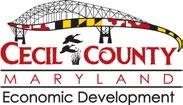
Sandra Edwards, Director 200 Chesapeake Blvd., Ste 2700 Elkton, MD 21921 410-996-8471 sedwards@ccgov.org www.ccgov.org
Director
500 Main Street, 5th Floor Courthouse Franklin, LA 70538 337-828-4100 ecodev@stmaryparishla.gov www.stmaryparishdevelopmant.com
Dorchester County Economic Development

Susan Banks, Director 104 Tech Park Drive Cambridge, MD 21613 410-228-0155 sbanks@choosedorchester.org www.choosedorchester.org
Talbot County Economic Development

Cassandra M. Vanhooser, Director 11 S. Harrison Street Easton, MD 21601 410-770-8000 Cvanhooser@talbgov.org www.talbgov.org
Economic Development Alliance

(EDA) of St. Clair County

Dan Casey, CEO 100 McMorran Boulevard 4th Floor, Suite B Port Huron, Michigan 48060 Ph: 810.982.9511 www.edascc.com stclairhotjobs.com
The Right Place, Inc

Andria Romkema 125 Ottawa Avenue, Suite 450 Grand Rapids, MI 49503 616-771-0563 romkemaa@rightplace.org www.Rightplace.org
City of Lakeville Community & Economic Development

David Olson Director 20195 Holyoke Avenue Lakeville, MN 55044 952-985-4421 dolson@lakevillemn.gov www.lakevillemn.gov
Alliance STL | an initiative of Greater St. Louis, Inc.

Steven S. Johnson
Chief Business Attraction Officer
One Metropolitan Square Suite 1300 St. Louis, MO 63102 314-444-1105 Steve@GreaterSTLinc.com www.GreaterSTLinc.com
Sikeston Regional Chamber & Economic Development Corp. Mike Marshall 128 N. New Madrid Street Sikeston, MO 63801 573-471-2498 mike.marshall@sikeston.net www.sikeston.net
Las Vegas Global Ecnomic Alliance
Perry Ursem Vice President, Business Retention + Expansion 6720 via Austi Parkway Suite #330 Las Vegas, NV 89119 702-791-0000 www.Ivgea.org


Sheldon Mudd, Executive Director
1500 College Pkwy McMullen Hall #103 Elko, NV 89801 775-738-2100 775-738-7978(f) smudd@nnrda.com www.nnrda.com





Tom Bianco, Director
1480 Tanyard Rd., Sewell, NJ 08080 856-384-6930 tbianco@co.gloucester.nj.us www.gloucestercountynj.gov
The Agency-Broome County IDA/LDC

Stacey Duncan, Executive Director of Community & Economic Development
Five South College Drive Suite 201 Binghamton, NY 13905 607-584-9000 607-584-9009 (f) smd@theagency-ny.com www.theagency-ny.com
North Carolina Global Transpark
Preston Hunter, Executive Director 2780 Jetport Road Kinston, NC 28504 252-775-6183 252-522-1765 (f) phunter@ncdot.gov www.ncgtp.com
Piedmont Triad Airport Authority
Ponca City Development Authority

David Myers, Executive Director
102 S. Fifth Street Suite 3
Ponca City, OK 74601 580-765-7070 580-765-7070 (f) dmyers@goponca.com www.goponca.com
Fulton County Center for Regional Growth
Ronald M. Peters 34 West Fulton Street Gloversville, NY 12078 518-725-7700 ext. 2 ronp@fccrg.org www.fccrg.org
Mohawk Valley Edge

Shannon Allen
1000A Ted Johnson Parkway Greensboro, NC 27409 336-665-5602 allens@gsoair.org www.landatpti.com
New Jersey EDA
Pat J. Rose
36 West State Street Trenton, NJ 08625 609-858-6705 prose@njeda.com www.njeda.com

EDC of Lea County
Jennifer Grassham, CEO
200 E. Broadway Street Hobbs, NM 88240 573-397-2039 jennifer@edclc.org www.edclc.org
Nick Bruno 584 Phoenix Drive Rome, NY 13441-4105 315-338-0393 nbruno@mvedge.org www.mvedge.org
Stanly County Economic Development Commission
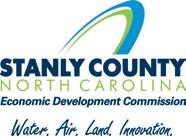

Candice Boyd Lowder, Director 1000 North First Street, Suite 11 Albemarle, NC 28001 704-986-3682 704-986-3685 (f) clowder@stanlyedc.com www.stanlyedc.com
Beaufort County Economic Development




Martyn Johnson, Director 705 Page Road Washington, NC 27889 252-946-3970 252-946-0849 (f) martyn.johnson@beaufortedc.com www.co.beaufort.nc.us
Bismarck Mandan Chamber EDC

Nathan Schneider , CEcD-Vice President 1640 Burnt Boat Dr. Bismark, ND 58503 701-223-5660 nschneider@bmcedc.com www.bismarckmandan.com

Lawrence DiBoni, Director of Economic Development 869 Park Avenue Cranston, RI 02910 401-780-3166 401-780-3179 (f) ldiboni@cranstonri.org www.cranstonri.com
City of Warwick
Department of Tourism, Culture, and Development
Elizabeth J. Dunton, Acting Director 3275 Pos t Road Warwick, RI 2886 401-921-7711 401-732-7662 elizabeth.j.dunton@warwickri.com movetowarwickri.com
Quonset Development Corporation
Steven J. King, Managing Director 95 Cripe Street North Kingstown, RI 2852 401-295-0044 sking@quonset.com www.quonset.com

Harnett
Allegany
Craig Clark, Executive Director
CrossRoads Center
6087 State Route 19N, Suite 100 Belmont, NY 14813 585-268-7445 585-268-7473 (f) clarkcr@alleganyco.com www.acida.org


Debbie Taylor, Marketing & Business Recruitment Manager 200 Alexander Dr. or PO Box 1270 Lillington, NC 27546 910-814-6891 919-814-8298 (f) dhtaylor@harnett.org www.harnettedc.org

Bartlesville Development Authority

Jared Patton, Vice President 201 SW Keeler Bartlesville, OK 74003 918-337-8086 918-337-0216 (f) jpatton@bdaok.org www.bdaok.org
Claire Gibbons
4401 Belle Oaks Drive, Suite 420 North Charleston, SC 29405 843-760-3351 cgibbons@crda.org www.crda.org
Sarah J. Johnson
Department Director 212 South Lake Drive Lexington, SC 29072 803-785-6818 sjjohnson@lex-co.com www.LexingtonCountyUSA.com
South Carolina I-77 Alliance
Christopher Finn
3200 Commerce Drive, Suite D Richburg, SC 29729 803-789-3467 chris.finn@i77alliance.com www.i77alliance.com
City of Lebanon

Sarah Haston
Economic Development Director
200 North Castle Heights Ave. Lebanon, TN 37087 615-443-2839 EXT. 2120 Sarah.Haston@lebanontn.org www.lebanontn.org
NETWORKS – Sullivan Partnership

Clay Walker
PO Box 747, Blountville, TN 37617 423-279-7681 cwalker@networkstn.com www.networkstn.com
Cedar Hill Economic Development Corporation


Andy J. Buffington, CEcD, IOM 285 Uptown Boulevard, Bldg. 100 Cedar Hill, TX 75104 972-291-5132 chedc@cedarhilltx.com www.cedarhilledc.com
DeSoto Economic Development
Matt Carlson, CEO 211 E. Pleasant Run Road DeSoto, TX 75115 Ph: 972-230-9611 mcarlson@desototexas.gov www.dedc.org LCRA
Karen Dickson
Economic Development Manager
City Development Corp of El Campo

Carolyn Gibson Executive Director
707 Fahrenthold P.O. Box 706 El Campo, TX 77437 979-543-6727 979-320-7727 cell cgibson@elcampoeco.org www.elcampoeco.org
Kay Maxwell
1750 Jackson Street, Suite 100 Barnwell, SC 29812 803-541-0023 kmaxwell@southerncarolina.org www.southerncarolina.org

Bryan Daniels CEcD, CCE, IOM President and CEO 201 S. Washington Street St. Maryville, TN 37804 865-983-2247 865-984-1386 bdaniels@blountpartnership.com www.blountchamber.com


April Eads
Business Development Manager
2470 Volunteer Parkway Bristol, TN 37620 423-793-5532 423-793-5545 (f) aeads@btes.net www.btes.net/index.php/economic-development
Big Spring Economic Development Corporation


Mark Willis 215 W. 3rd Street Big Spring, TX 79720 432-264-6032 markwillis@bigspringtx.com www.bigspringtx.com
Bowie Economic Development Corporation

Janis Crawley 101 E. Pecan, Bowie, TX 76230 940-872-4193 940-531-8201(c) BEDC@BowieTexasEDC.com www.BowieTexasEDC.com
City of Fort Worth
Robert Sturns, Director 1150 S. Freeway Fort Worth, TX 76104 817-392-2663 Robert.Sturns@fortworthtexas.gov


3700 Lake Austin Blvd. Austin, TX 78703 512-578-3291
karen.dickson@lcra.org www.lcra.org/economic-development/ pages/default.aspx
McKinney Economic Development Corporation
Peter Tokar III President/CEO 5900 S. Lake Forest Drive McKinney, TX 75070 972-435-6953 ptokar@mckinneyedc.com www.uniquemckinney.com
City of Leander
Cameron Goodman Economic Development Director 201 N Brushy Leander, TX 78641 512-528-2852 cgoodman@leandertx.gov www.leanderbusiness.com
Mineola Economic Development Corp

Mercy Rushing, Executive Director 300 Greenville Highway Mineola, TX 75773 903-569-6183 903-245-8505 mrushing@mineola.com www.mineola.com
Cameron Industrial Foundation
Ginger Watkins, Executive Director 102 E. First Street, Suite A Cameron, TX 76520 254-697-4970 254-482-1119 (c) gwatkins@cameronindustrialfoundation.com www.cameronindustrialfoundation. com
Conroe Economic Development Council

Danielle Scheiner, Executive Director 300 W Davis St, Ste 510 Conroe, TX 77301 USA 936-538-7118 scheiner@conroeedc.org www.conroeedc.org
Odessa Economic Development Corporation


Tom Manskey
700 N. Grant Ave. Odessa, TX 79761 432-333-7880 tom@odessaecodev.com www.odessatx.com
Jacksboro Economic Development Corporation
Lynda Pack
Executive Director P.O. Box 610 Jacksboro, TX 76458 940-567-3151 lyndapack@jacksboroedc.com www.jacksboroedc.com
Laredo Economic Development


Gene Lindgren
President & CEO
P.O. Box 2682 Laredo, TX 78044 956-722-0563 glindgren@laredoedc.org www.laredoedc.org
Plainview Economic Development Corporation


Kristi Aday, Executive Director 1906 West 5th Plainview, TX 79072 806-293-8536 kaday@plainviewtx.org www.plainviewedc.org
TexAmericas Center

Eric Voyles, Executive Vice President Chief Economic Development Officer 107 Chapel Lane New Boston, TX 75570 903-306-8923

Eric.Voyles@texamericascenter.com www.texamericascenter.com

Pam Bailey
Director of Economic Development Bedford County



122 East Main Street, Suite 202 Bedford, Virginia 24523 540-587-5670 pbailey@bedfordcountyva.gov www.bedfordeconomicdevelopment. com



Kathy Collins, VP Economic Development
8517 Excelsior Drive, Suite 107 Madison, WI 53717 608-571-0407 kcollins@madisonregion.org www.madisonregion.org
Marble Falls EDC
Christian Fletcher
801 Fourth Street Marble Falls, TX 78654 830-798-7079 cfletcher@marblefallseconomy.com www.marblefallseconomy.com
Mount Pleasant EDC
Nathan Tafoya, Executive Director 1604 N. Jefferson Ave. Mount Pleasant, TX 75455 903-572-6602 nathan@mpedc.org www.mpedc.org
New Braunfels EDC

Michele Boggs
Marketing/Research Director
390 S. Seguin Avenue New Braunfels, TX 78130 830-608-2811 michele@innewbraunfels.com www.newbraunfelsedc.com
Whitesboro Economic Development Corp.
Lynda Anderson, Director P.O. Box 340 or 111 W. Main Whitesboro, TX 76273 930-564-3311 landerson@whitesborotexas.com www.whitesborotexas.com

Aaron Sanborn, City Administrator 1650 E. Stagecoach Run Eagle Mountain, UT 84005 801-789-6621 asanborn@emcity.org www.eaglemountaincity.com

City of Lakewood Economic Development
Becky Newton, Manager 6000 Main Street SW Lakewood, WA 98499 877-421-9126 bnewton@cityoflakewood.us www.buildyourbetterhere.com
City of Maple Valley Tim Morgan Economic Development Manager P.O. Box 320 Maple Valley, WA 98038 425-413-8800 tim.morgan@maplevalleywa.gov www.maplevalleywa.gov

New North, Inc

Barb LaMue President & CEO 2740 W. Mason Street Green Bay, WI 54303 920-676-1960 barb.lamue@thenewnorth.com www.thenewnorth.com
Pflugerville Community Development

Amy Madison 3801 Helios Way Suite 130 Pflugerville, TX 78660 512-990-3725 amym@pfdevelopment.com www.pfevelopment.com
Arlington Economic Development
Telly Tucker, AED Director 1100 N Glebe Rd Suite 1500 Arlington, VA 22201 703-228-0808 703-228-0805 (f) ttucker@arlingtonva.us www.arlingtoneconomicdevelopment. com
Try-City Development Council
Karl Dye, President & CEO 7130 W. Grandridge Blvd #A Kennewich, WA 99336 509-735-1000 kdye@tridec.org www.tridec.org


City of Franklin Economic Development
Calli Berg, Director 9229 W. Loomis Road Franklin, WI 53132 414-427-7566 cberg@franklinwi.gov www.franklinwi.gov
Portage County Business Council, Inc. PCB Todd Kuckkahn Executive Director 5501 Vern Holmes Drive Stevens Point, WI 54482 715-344-1940 715-344-1940 (f) tkuckkah@portagecountybiz.com www.portagecountyconnects.com

Advance Casper
Morryah McCurdy
111 S. Durbin, Suite 200 Casper, WY 82601 307-577-7011 morryah@advancecasper.com www.advancecasper.com
Betsey Hale, Chief Executive Officer
One Depot Square 121 W. 15th St. Suite 304 Cheyenne, WY 82001 307-638-6000 betseyh@cheyenneleads.org cheyenneleads.org


Josh Boudreau, VP Economic Development
528 South Adams Street Laramie, WY 82070 307-745-7339 jboudreau@laramie.org www.laramie.org
ALBERTA
Calgary Economic Development
500 Centre Street S, 32nd Floor
Calgary, Alberta, Canada T2G 1A6 403-221-7831 info@calgaryeconomicdevelopment.com www.calgaryeconomicdevelopment.com
City of Brandon
Dan Fontaine
Business Development Specialist Main Floor, 410 9th Street Brandon, Manitoba, Canada R7A 6A2 204-729-2133 d.fontaine@brandon.ca www.economicdevelomentbrandon.com



County of Elgin

Kate Burns-Gallagher Manager Economic Development And Tourism
450 Sunset Drive St. Thomas, Ontario, Canada N5R 5V1 519-631-1460 ext. 137 kburns@elgin.ca www.progressivebynature.com




Chistina Kakaflikas, Ec. D. Director of Economic Development Office
Mississauga City Hall
300 City Centre Drive, 3rd Floor Mississauga, ON L5B 3C1 Canada 800-456-2181 905-896-5931
christina.kakfikas@mississauga.ca www.TheFuturelsUnlimited.ca
City of Guelph Christine Chapman
1 Carden Street
Guelph, Ontario, Canada N1H 3A1 519--822-1260 ext. 2823 Christine.chapman@guelph.ca www.guelph.ca/business

Raphael Costa
Vaughan City Hall, Level 200 2141 Major Mackenzie Drive
Vaughan, Ontario, Canada L6A 1T1 905-832-8526 ext. 8891
Town of Ajax Samuel Twumasi Manager, Economic Development & Tourism 65 Harwood Avenue South Ajax, Ontario, Canada L1S 2H9 905-619-2529 ext. 3281 samuel.twumasi@ajax.ca www.ajax.ca

Middlesex County

Cara A. Finn, BBA, M. Ad.Ed. Director of Economic Development 399 Ridout St. North London, ON N6A 2P1 519-434-7321 cfinn@middlesex.ca www.investinmiddlesex.ca
raphael.costa@vaughan.ca www.vaughan.ca/Business
Paula Lehr
40 Crowther Lane, Ste. 100
Fredericton, NB E3C 0J1 506-282-0624
paula.lehr@ignitefredericton.com www.ignitefredericton.com
bxjmag.com
